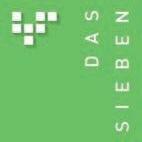


















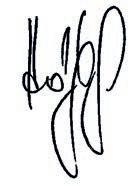
Let’s look back on our childhood: how much we loved it when the first snowflakes began to dance down from the skies, marking the arrival of winter! Kitted out with gloves and a hat, we raced outside as fast as the wind to experience this magical showcase for ourselves. And years later, the fascination remains, albeit different. Instead of snow discs, most of us now have skis, snowshoes or sledges. The natural Aschinger Alm toboggan run in Ebbs is ideal for fun on 2 runners, for example. We visited the track and have written a useful report on our experiences.
During the cold season, Kufsteinerland is pleasantly quiet and cosy. Winter transforms the landscape into a film-set scenery – a white wonderland. The best way to explore this showcase is on foot, for example as part of a snowshoe tour on the Erlerberg: for our magazine, we set off with a guide to the Spitzstein – with a leisurely refreshment break included. We also paid a visit to Hannes Unterrainer in Bad Häring. The wild animal keeper spoke about the great importance of treating nature and animals with care and respect.
Art can build bridges between the past and present and we show this in our story of Oskar Mulley. He lived in Kufstein from 1918 to 1933 and here became an internationally renowned and multiple award-winning painter. This and many other reports await over the following pages. This edition also contains some interactive content to explore. In addition to some wonderful stories and imposing pictures, we present videos, audio sessions and 360°views.
Happy reading and adventures!
To keep dreaming about Kufsteinerland after your holiday, follow us on Instagram and Facebook.
Imprint: Responsible for the content: TVB Kufsteinerland, Unterer Stadtplatz 11-13, 6330 Kufstein, Tel. +43 5372 62207

Circulation: 5,000 in German, 2,000 in English, Design / Text / Graphics: ofp kommunikation GmbH Kufstein Place of publication: Kufstein
Print: Aumüller Druck GmbH & Co. KG Regensburg
Cover photo: Max Draeger
from Kufsteinerland.
Step 1
Since the last edition, Moments magazine has been featuring interesting stories as well as interactive content, providing a whole different insight into our region. Using the innovative Augmented-Reality-App Livi AR, you can now experience our stories in the form of videos, audio sessions, 360-degree recordings and much more.
Step 2
Install the free Livi AR app.

Activate the experience ‘Moments Winter 2022/23’ in the app or scan the lilac smartphone.

Step 3
When you see this symbol over the following pages, you can hold your camera over the relevant image to play the content.
More information at: www.livi-ar.at
When it comes to ‘showcases of nature’, Thiersee has plenty to offer. Situated on a sunny mountain plateau, the idyllic community is a popular destination for outdoor enthusiasts. In our photo gallery, we present some of the most popular spots.
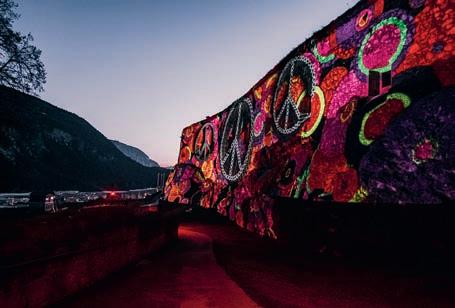
Following the great success of the first Kufstein Festival of Light ‘The Voice of the Fortress’, the second edition will be taking place this year! We share what makes the event so exceptional and even have an interview with the renowned voice actress Regina Lemnitz.
No matter the season, Hannes Unterrainer is busy looking after 20 to 50 wild animals in 2 enclosures. In our report, the Bad Häring resident discusses what his work involves and why it is becoming increasingly important to approach nature and animals with great care.
Austrian painter Oskar Mulley was known primarily for his paintings of mountain landscapes. His second home of Kufstein had a considerable impact on the artistic development of his talent.
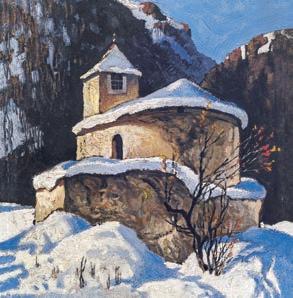 Photo: Digitalarchiv Herbert Ascherbauer
Photo: Digitalarchiv Herbert Ascherbauer
22
A shared experience of cultural highlights forms the core of the work of UNOS 93. As the chair, Margarethe Egger presides over an association which is committed to culture and togetherness in Langkampfen.
Kufstein offers wide-ranging leisure opportunities and delicious gourmet breaks to suit any taste. Read more in the story about how to enjoy a leisurely shopping trip with children.
34
Christoph Bichler has re-interpreted one of the oldest luxury drinks known to man at his brewery in Schwoich. Away from the mainstream beers, the Bierol instead represents sophistication and versatility.
Situated at the heart of Niederndorf, Lotte Kaltschmid exhibits treasures from times gone by. We paid a visit to the newly designed ‘Zur alten Schmiede’ local history museum.

Walking guide Harald Löffel takes us on a dreamy snowshoe walk incl. gourmet refreshment break on the Erlerberg.
Photo: PHILIPP. PHOTO.We present some helpful tips to make your winter time-out in Kufsteinerland even more unforgettable.
Want to see an all-round imposing view? Grab your smartphone, scan the image and enjoy a wintry 360-degree view. Download app on p. 4.

Majestic peaks, idyllic farms, an icy lake and snowy forests form the magnificent backdrop of Thiersee. Situated on a sunny mountain plateau, the community is home to 3,100 inhabitants as well as being a popular destination for nature lovers. Cross-country fans will also find the ideal conditions here. Several trails lead through the romantic winter landscape, one of which runs around the Thiersee lake and past the traditional Passion Playhouse shown in the image. Another guides sporty visitors over the border to Bavaria. The new route starts out from the Mariandlalm car park and leads via the Ursprungpass along the Thierseer Ache through a wintry forest where it joins the Bayrischzell cross-country network.
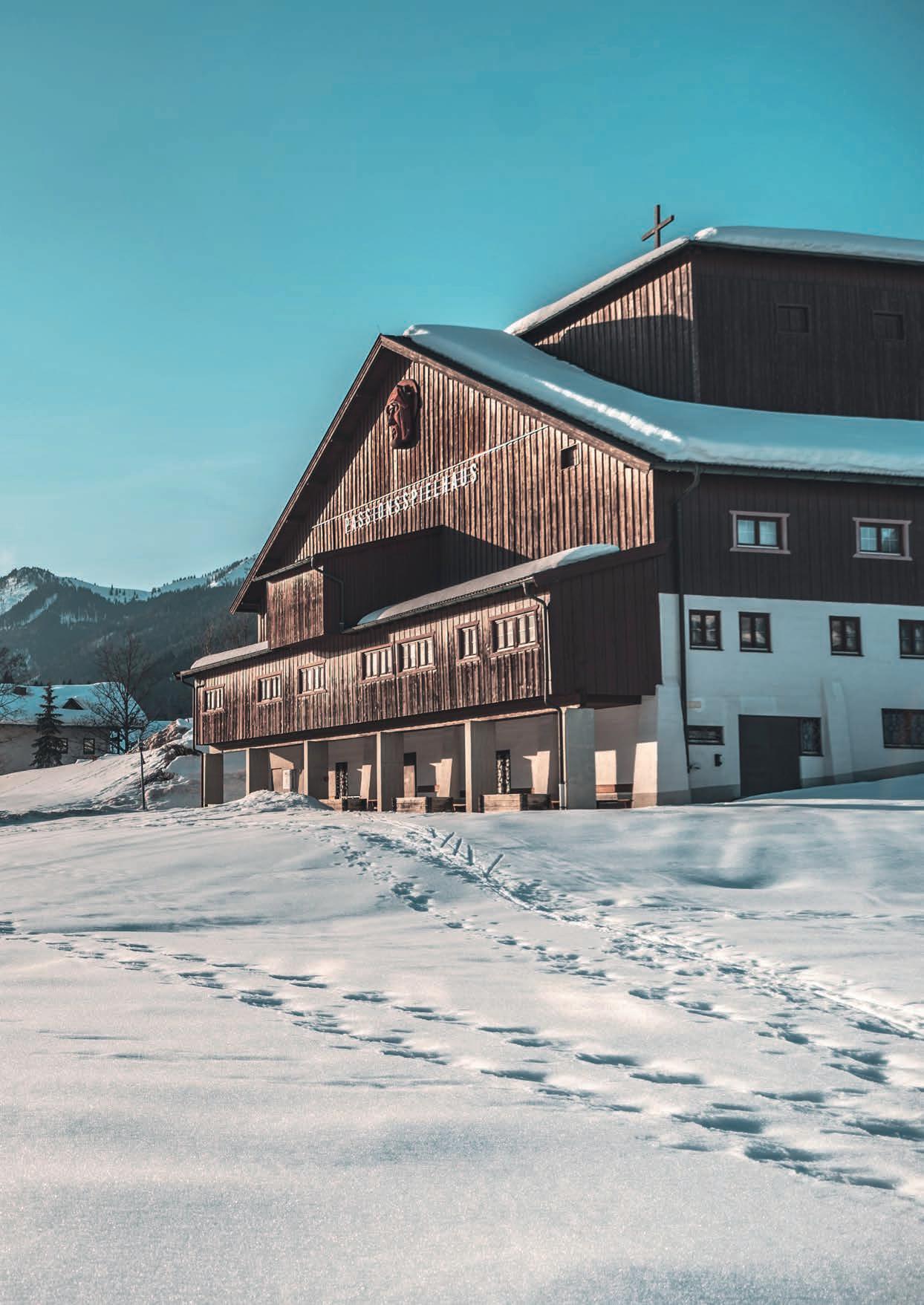
What would winter be like without a fun sledging trip? The illuminated 3.1 km natural toboggan run is particularly popular and runs from the Kala Alm. After approx. 1 hour’s walking time, you reach the traditional yet modern lodge via an idyllic winter footpath. The friendly landlords serve delicious Tyrolean treats in a cosy setting. Tip: those who prefer not to pull their sledge up to the top themselves can hire a high-quality sledge from the Kala Alm for a small fee.
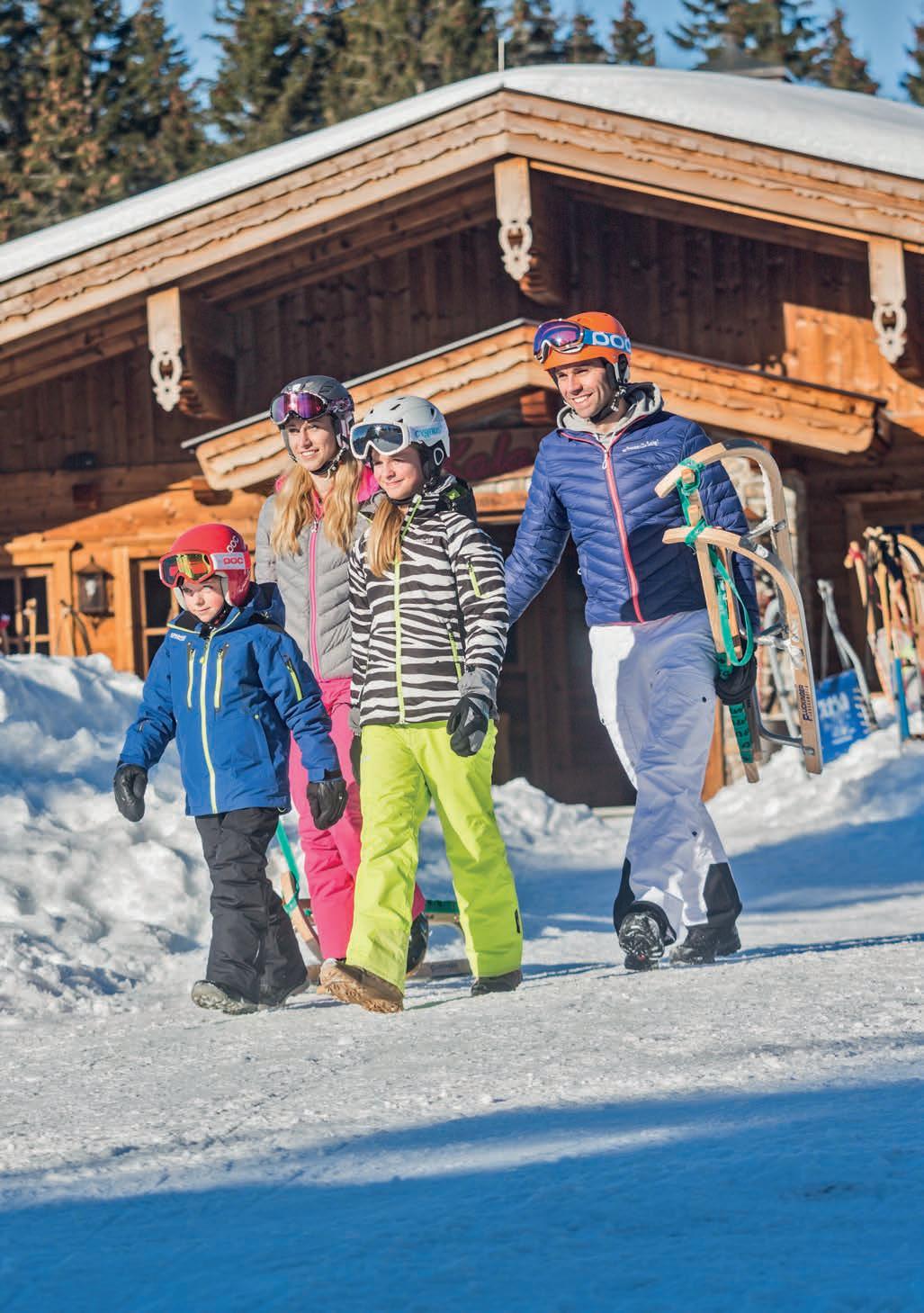
The town is located at the foot of the 1,563m Pendling which towers over the Inntal valley with its craggy shape. The mountain is steep from the south and gentler from the north: the summit can be reached after an approx. 1.5 hour walk starting out from the Schneeberg car park in Thiersee. The winter footpath up to the Kala Alm is cleared but snowshoes are required at points from here onwards. It should also be remembered that this is an off-piste terrain tour and visitors are responsible for their own actions. Once at the top, views extend as far as the Grossglockner in good weather. There are also imposing views of the fortress town of Kufstein.

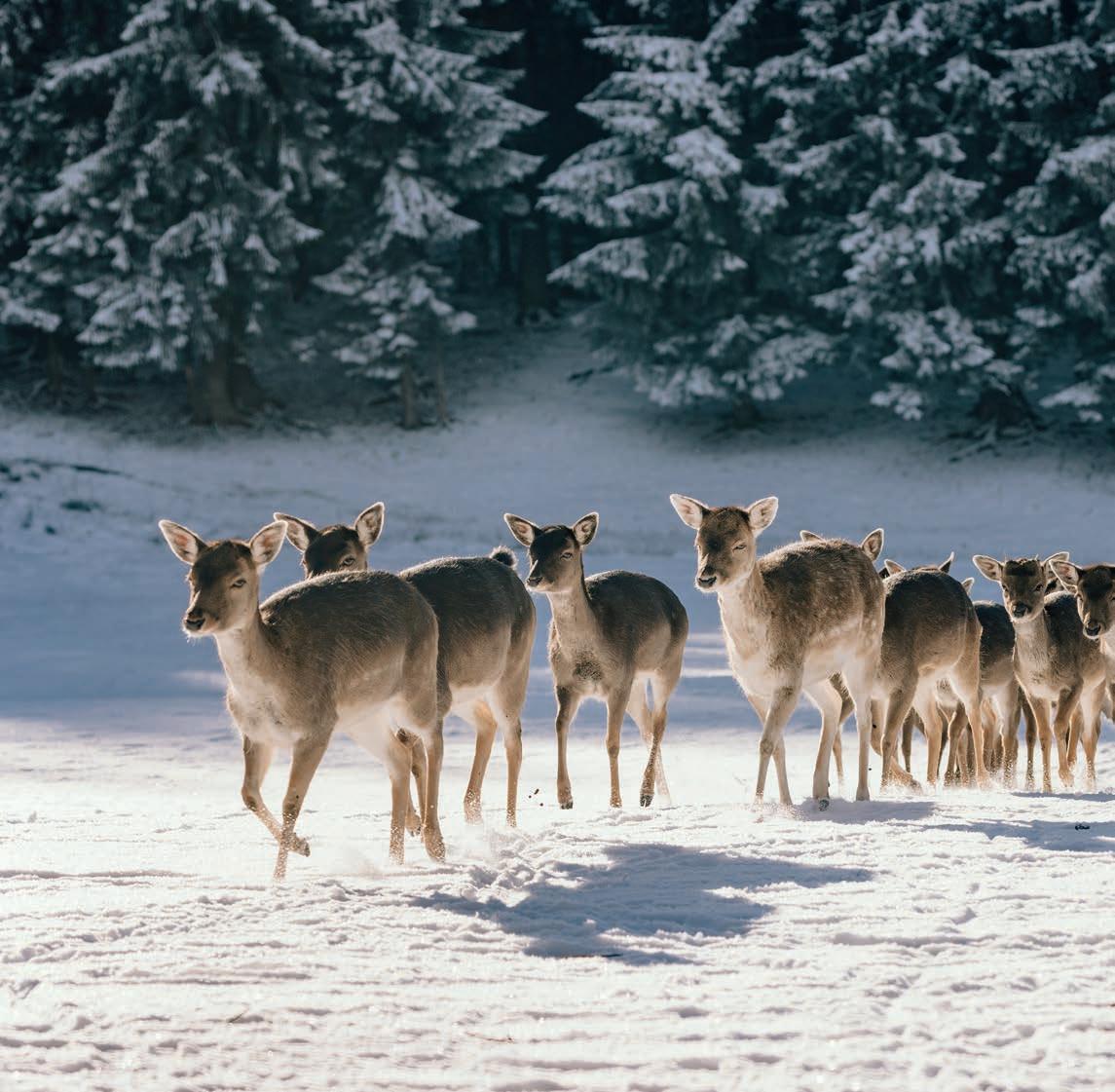
No matter the season, there are always between 20 and 50 animals living in the two enclosures of wild animal keeper Hannes Unterrainer in Bad Häring. While deer in the wild seek out the tranquillity of the forest, the fallow deer are curious and come up to visitors by the fence.

Theseare herd animals – that is immediately clear. When one of the animals sets off, the others follow. The pack of fallow deer are headed by a colossal stag. He does not have the classic antlers but instead has palm-like antlers and looks more like an elk than a wild red deer. “Fallow deer are a different species from the deer you see out in the wild,” Hannes Unterrainer explains. He rears these wild animals in two large enclosures in Bad Häring. One is located close to the village centre right behind the Dallnhof and the other extends along the edge of the forest in a picturesque setting.
From dairy production to wild animal breeding
Hannes Unterrainer is a wild game keeper by birth. He took over the rearing of the fallow deer from his father. The qualified mechatronics engineer grew up on the Dallnhof. The history of the farm dates back to the year 1295. If the village chronicle is to be believed, it is the oldest farm in Bad Häring. The picturesque mountain village almost grew around the farm. The property has been owned by the family since 1878. As with many farmers in the region, the Unterrainer family faced a difficult decision at the start of the 90s: the dairy industry (small with just six dairy cows) was no longer profitable. Since relatives from Styria already had good experience of rearing wild animals, they decided to realign the business and came up with the idea of turning to wild deer. A short time later, the first fallow deer enclosure was installed.
The fallow deer enclosure is located on the route to the Bad Häring waterfall on the edge of the forest with various footpaths running by. Leading from the village centre, the main road leads out of the village towards Schwoich. Before the steep section, keep to the right and turn onto a narrow forest trail leading straight to the fallow deer enclosure.
See the wild amimals up-close Hold your smartphone over the image to gain a 360-view of the wild animal enclosure and watch the animals.
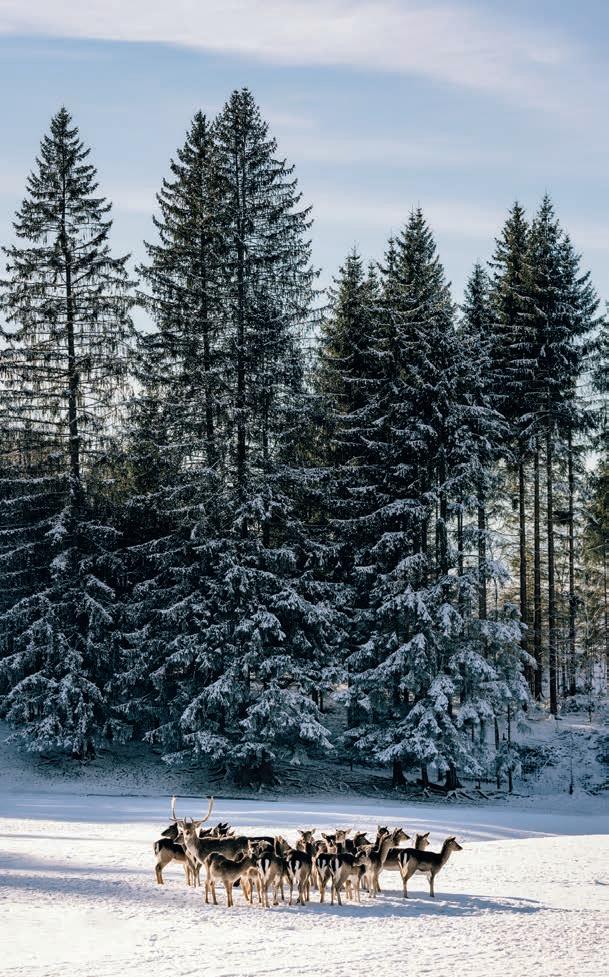
Download appl on p. 4.

In winter, Hannes Unterrainer visits his animals once a day. “They are given hay from our own meadows, supplemented with concentrate, as is used in cattle farming,” says the wild animal keeper. The animals do not need more supervision than that. The fallow deer are curious and always hungry: whenever there are kids playing by the fence, rustling a paper or plastic bag, the animals come straight over to greet their visitors. Feeding the animals is permitted here, as Hannes Unterrainer confirms. “The animals can have dry bread. But it is better that they have windfall apples”. One advantage of this species is that the animals do not have full teeth but rather tough gums. The risk of being bitten is therefore very slim and even the youngest children can enjoy feeding the animals.
Visitors wishing to see the fallow deer in action can attend a wild animal feeding session. The sessions take place every Thursday at 16:30, on request, at the fallow deer park in Bad Häring.
Register here for the next fallow deer feeding session.
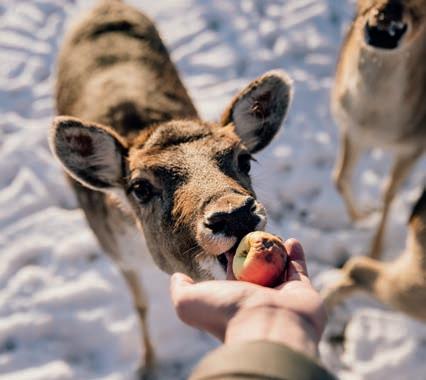
The second fallow deer enclosure is situated in the village itself. It surrounds a newly built riding arena. The two areas are separated by a fence. It is very important for the animals to have their own spaces because the fallow deer would otherwise feel disturbed by the presence of the horses. As wild animals, they are very curious but also have a certain fear of people. “If I approach the enclosure alone, the animals come to me and even eat out of my hand,” Hannes Unterrainer says of these precious moments as a wild animal keeper. His protégés are used to him. For other humans – it’s best to keep out! To stroke or feed the animals, simply stick a hand through the fence. The fallow deer will then suddenly rear their heads and flick their ears forwards. And if they feel like it, they will come over. They then come over across the snowy fields to see people as a herd.
Whether a ski tourer, snowshoe walker, skier or winter hiker, people are often out and about during winter, exploring the territory of the wild animals. It is advisable to avoid disturbing the sensitive wild animals:
During a walk through the winter forest, stick to the edge of the forest and the signposted paths.
During dawn and dusk, it is best to leave wild animals alone in their habitat.
It goes without saying that any unnecessary noise should be avoided and dogs should be kept on a lead.
The Wildbichl wildlife park is around a half an hour’s drive from Bad Häring on the Niederndorferberg. Animal lovers of all ages can get to know the Alpine fauna better here: in addition to the fallow and red deer, chamois, moufflons, wild boar and lynxes can be observed.
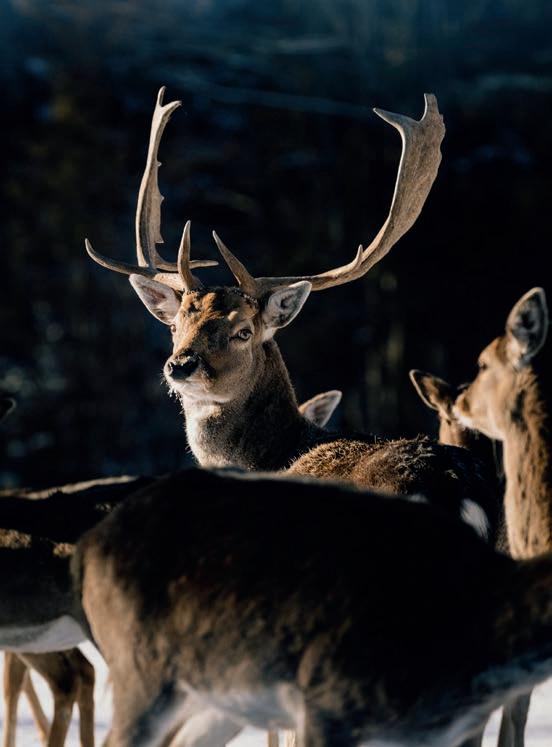
The original Hungarian ‘racka’ sheep with their twisted horns and the sweet miniature goats are particularly popular with children. A large playground spans an area of 80,000 m2 and the ‘s‘Hütterl’ offers welcome refreshments. The Wildbichl wildlife park can be visited free-of-charge with the KufsteinerlandCard.
More infomration about opening hours at www.wildpark-wildbichl.com (Subject to changes)
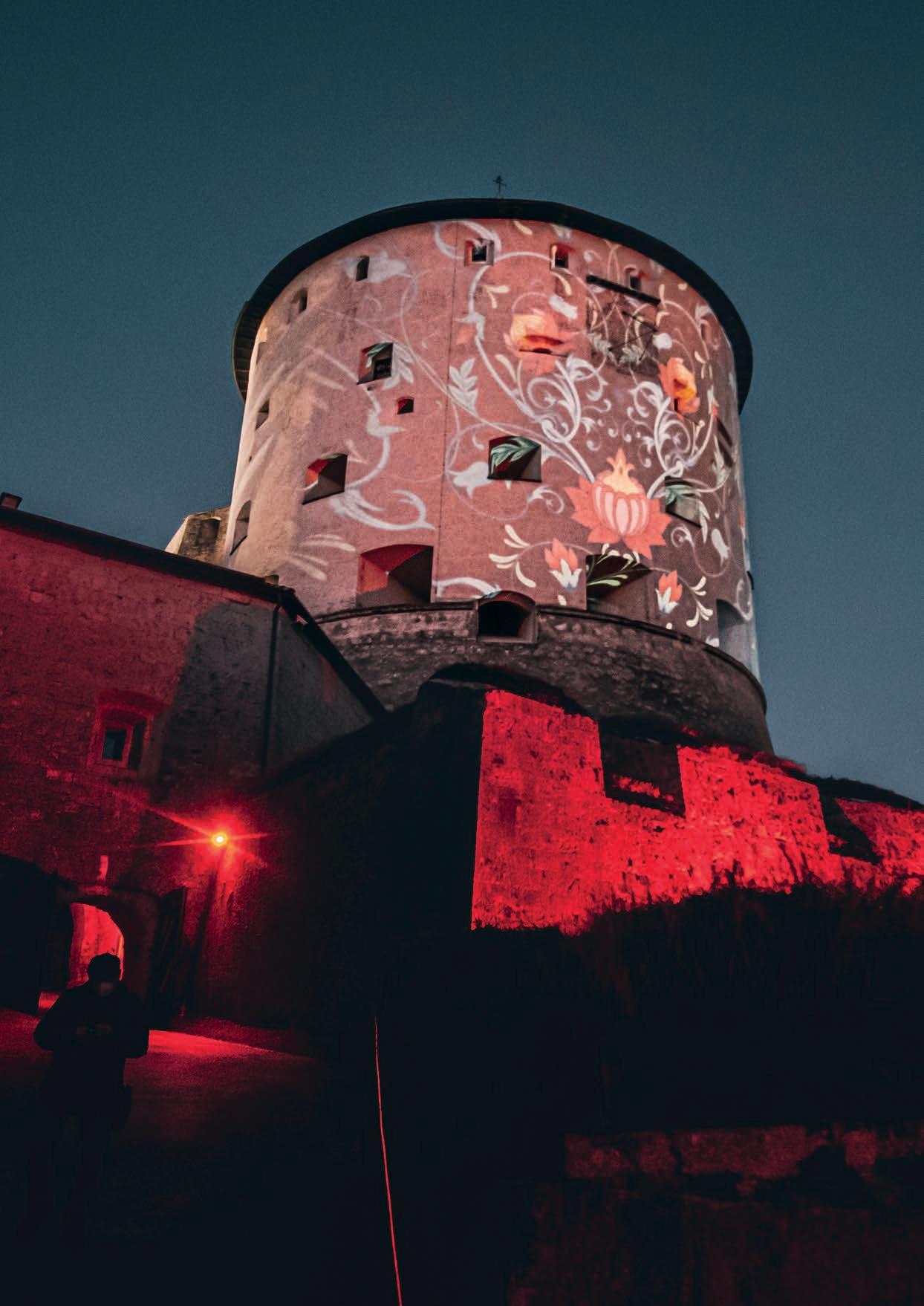
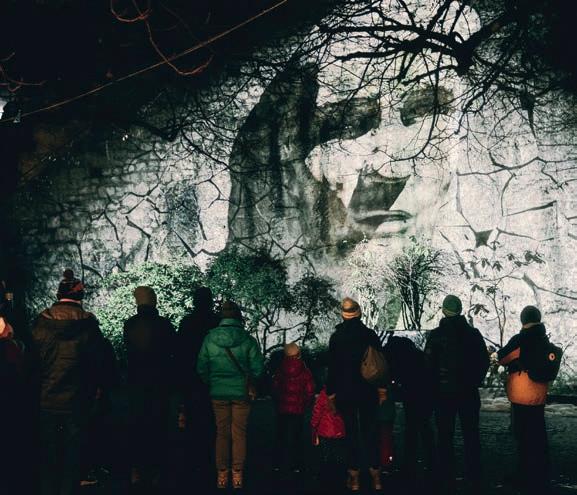
Following the great success of the first Kufstein Festival of Light (‘The Voice of the Fortress’), the second edition will be taking place from 27 December 2022 to 29 January 2023. Kufstein Fortress has found its language through author Klaus Reitberger and its voice through voice actor Regina Lemnitz.
Inthe first year, some 6,000 people followed the call from the voice of the fortress. The panorama lift transported them up to Kufstein Fortress where they were welcomed by a guide who led them from station to station: an artistic video projection brought the rock in the inner courtyard of Kufstein Fortress to life – a truly impressive experience! The fortress spoke to the people with a strong voice. In doing so, it broke its thousands of years of silence as the people stood watching
on, themselves silent. Further projections awaited the audience on the south side of the fortress and the Kaiserturm tower (extremely photogenic!) and in the so-called ‘heart chamber’ deep inside the fortress mountain.
The fortress has plenty of stories to tell and not just about its lively past. It has created something which people rarely achieve: it has learnt from history and applies knowledge from the past to the future. It is little wonder then that the fortress has become a pacifist as a result of its warring history. It has witnessed how a mediaeval small town has become a cosmopolitan university town – something which has made the fortress a fan of science. Not least, it is committed to renewable energy and pleads for people to value the surrounding nature because this is our greatest capital of all.
“I want to make the fortress speak in a way that it is directly understandable to people. I always draw on the realities of life which we are all sharing,” Klaus Reitberger explains of the content for which he is responsible. The theatre producer is famous on Kufstein’s cultural scene and, as an author, helped the fortress to find its voice: “With the festival, we can perhaps reach out to people who would typically
The voice of the fortress Fancy a taster? If you hold your smartphone over the illuminated fortress, it literally comes to life in the form of a video. Download app on p. 4.
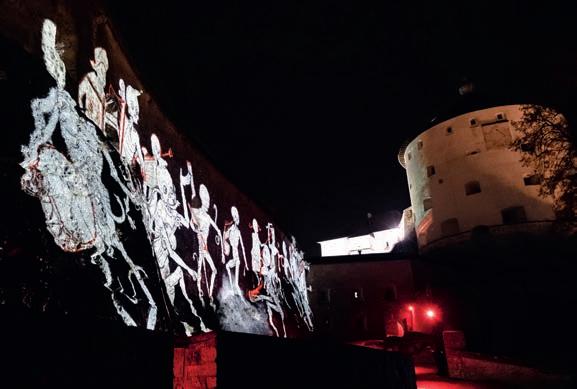
go to the theatre. They are in search of entertainment and an appealing change from everyday life. We use this opportunity and give them a message to take away with them”.

The choice of the voice fell to a woman – what else could it be for ‘the fortress’. The name Regina Lemnitz is largely unknown but many people have heard her voice. She even voiced Whoopi Goldberg in Sister Act and the character of Bertha in Two and a Half Man. And now she has given her voice to Kufstein Fortress. Even for an experienced voice artist, bringing the historic building to life was a special experience. “I am fascinated by the history of the fortress,” the 85-year old confirmed in a press conference.
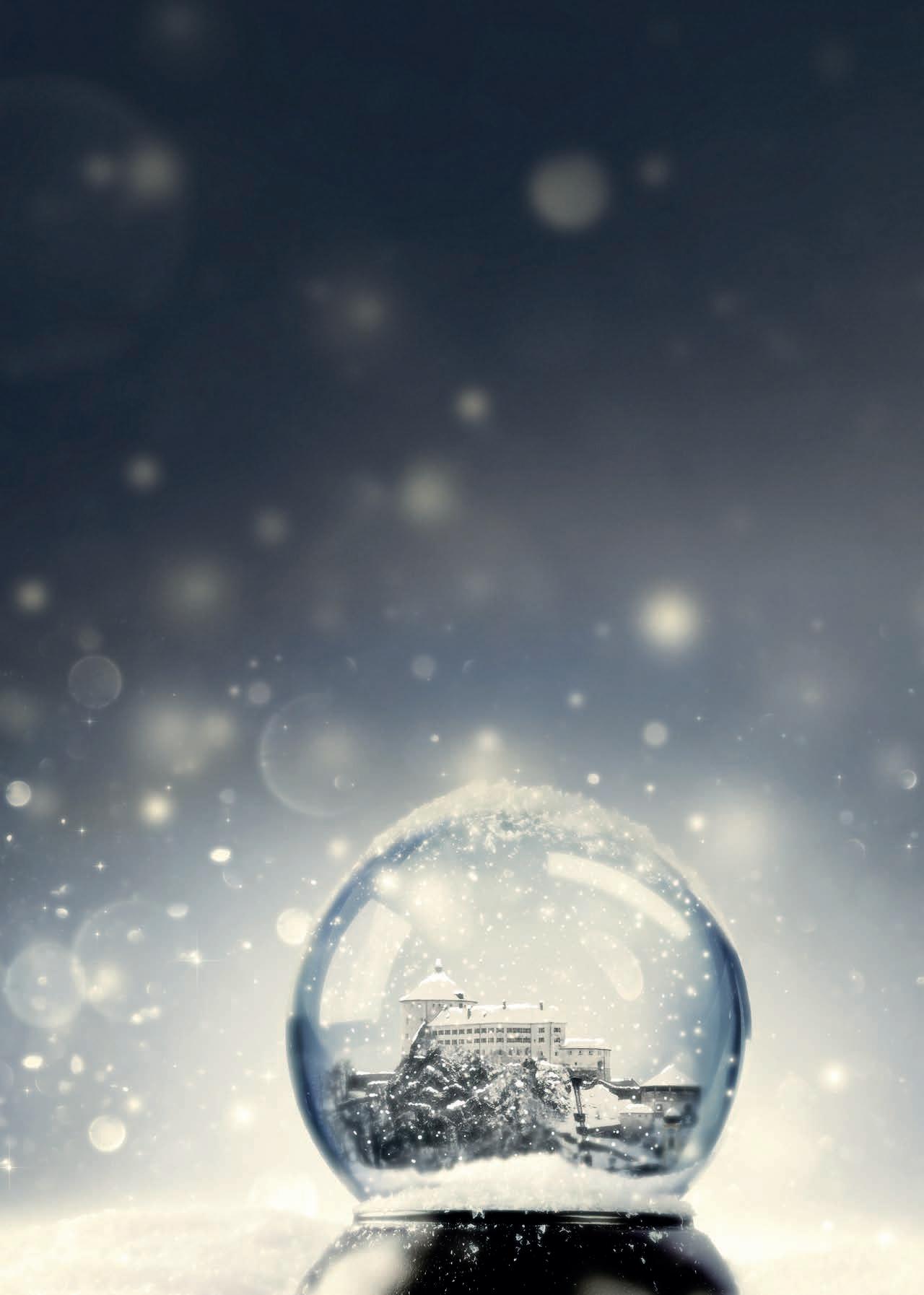
Born in 1946 in Berlin, the German actress, singer and voice artist Regina Lemnitz will go down in history as the German voice of Whoopi Goldberg, Kathy Bates, Roseanne Barr and Conchata Ferrell. In 2021, she lent her voice to the Kufstein Fortress. Regina Lemnitz lives in Berlin.
For further information about the event, please visit. www.kufstein.com
The fortress should not be silent “Feedback from the first year was very positive,” Klaus Reitberger confirms. “It is important not to forget that this is a highly photogenic event. It has been posted a lot on social media. Even images on TV have attracted visitors”. Work is taking place on new content for the upcoming season. “I envisage wide-ranging changes but I don’t want to give away too much yet,” the author says. Financing for the project has been secured for three seasons. The Kufsteinerland Tourist Board, along with support from the state of Tyrol, the town of Kufstein and the surrounding communities, has donated generously to fund the Kufstein Festival of Light.
It is clear that the walls of the fortress mountain will continue to listen to the people too. “Only then can the fortress gain knowledge – it listens to its visitors, listens into the stories of its guests and draws its own conclusions,” Klaus Reitberger explains. He envisages a kind of look back at the year from the perspective of the fortress, something he is prepared to share now. Having found its voice in 2021, the fortress will perfect its voice over the coming year to ensure that it can be heard in the future too: audiences should be excited to hear what else the fortress has to tell.


The fortress opens its gates to welcome guests from all over the world. Visit our museums, enjoy the spectacular view and stop by for a bite or drink at the fortress‘ restaurant.

Innsbrucker Nachrichten on 4 October 1919
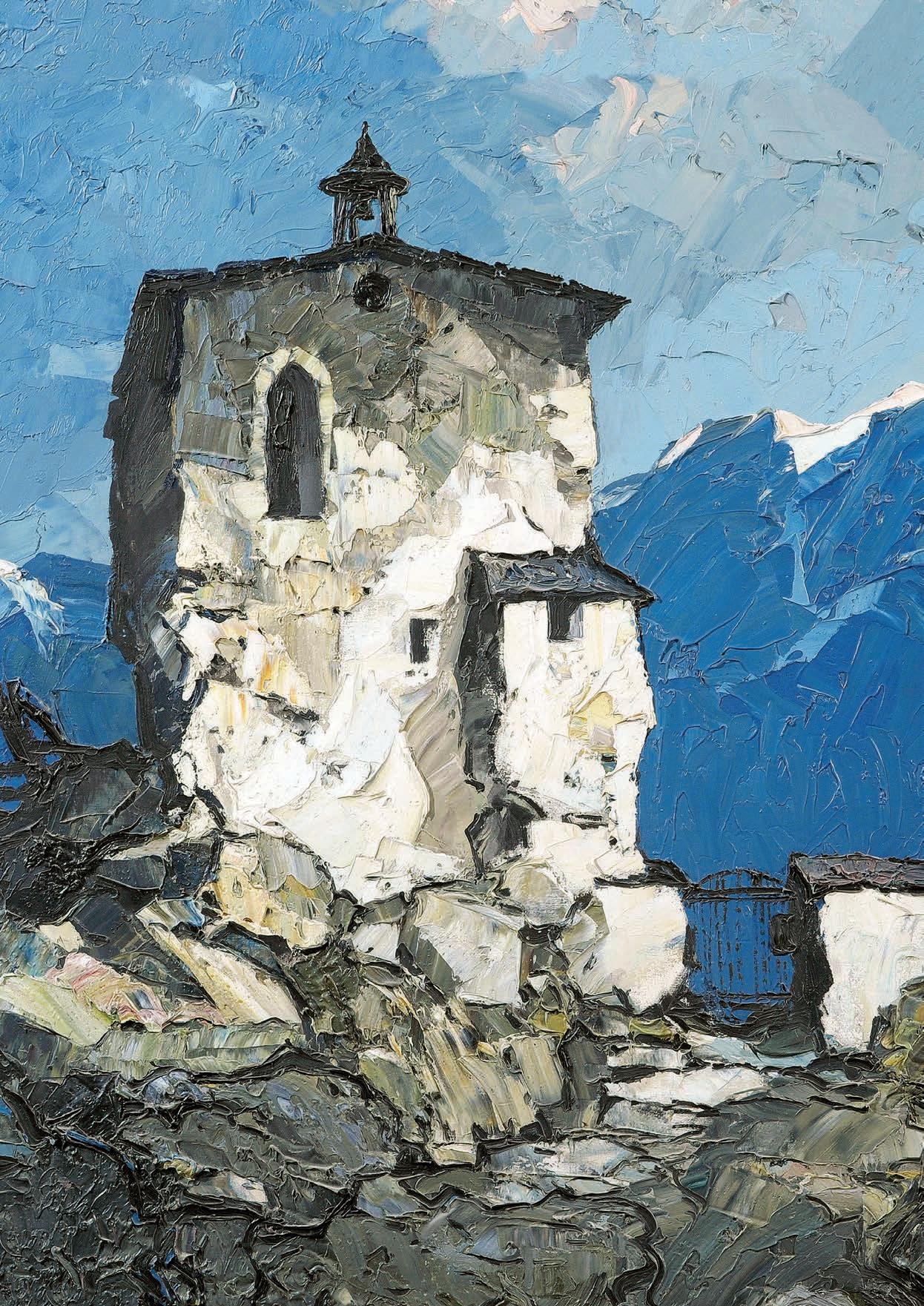
“With Mulley, there is also a poet and philosopher behind the painter who deliberately enhances the purely artistic impact and in doing so, leaves a lasting impression“
The painter, Oskar Mulley, who came from Carinthia and became famous in Kufstein, was especially known for his paintings of mountain landscapes. His chosen home of Kufstein had a considerable influence on this great talent‘s artistic career progression.
Oskar Mulley was born in Klagenfurt in 1891. From his early childhood he was less interested in school and more in drawing and painting – much to the dismay of his parents. Although his father hoped that he would pursue a career with a secure position, Oskar went his own way and persuaded his parents that he wanted to train to become a painter. And so in autumn 1910, he passed the entrance exam to the Vienna Academy of Fine Arts and was able to start in the second year. The war scuppered the plans of the academic painter: in autumn 1914, Oskar Mulley was required to sign up for duties.
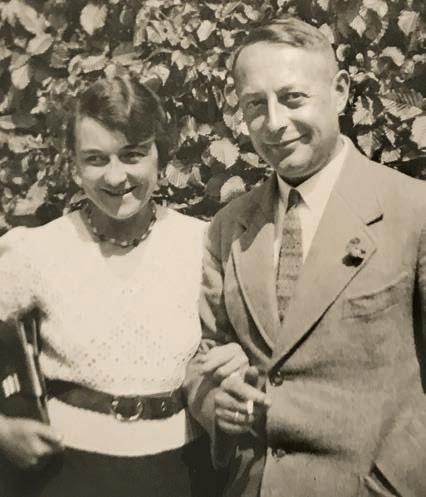
At the end of the First World War in 1918, the artist was relocated to Kufstein. In this fortress town on the green river Inn, he found a new home with his wife Luise and at the same time, a new source of inspiration. The first apartment of the newlyweds was in the so-called ‘Schluifer-Villa’. The two quickly made social contacts in Kufstein due to their friendly and sociable manner. Their daughters Inge and Gerda were born in 1920 and 1929. His first years as a freelance artist could be described as his experimental phase. Up until 1925, Oskar Mulley was searching for his technique and motifs and was still rooted in the artistic impressions of the Art Nouveau and Symbolism instilled in him in Vienna. Soon he began to capture attention in artistic circles outside of Tyrol with his moonshine images and painted works. During this period, Oskar Mulley also began to impress with his oil paintings and the ‘unmistakeable strong talent’ received great praise from both the public and the press. The artist was inspired by the towering cliff walls, menacing abysses, isolated farmsteads, mountain villages, chapels and wayside shrines which capture the attention in his large-scale paintings.
In 1925 and 1926, Tyrolean artists were invited to exhibit a cross-section of their works as part of a travelling exhibition through seven large cities in
This painting of Kufstein Fortress by moonlight was created during Oskar Mulley’s experimental phase –before his first palette knife oil painting in 1922. It was acquired by the Kufstein local history museum at auction. Additional creations by the renowned mountain painter can be admired at the local history museum or in our digital slide show. Take your smartphone, aim the camera at the image and more Mulley works of art will flick across your screen. Download app on p. 4.

Germany. Mulley created his first „pastoses“ oil painting for the occasion. In the years that followed, the Tyroleans became aware of the Vienna Secession, and organised a large exhibition entitled‚ Tyrolean artists - Representative exhibition in the Secession“, between 9th July and 6th August 1927. Mulley was represented in the exhibition with three paintings ‘Mountain Lake’, ‘Farmhouse’ and ‘Hunting Scene’ and was able to celebrate two extraordinary successes: his ‘Mountain Lake’ image won a gold state prize for fine art and he was invited by the committee to become a full member of the Secession – a rare honour for an artist. In terms of the quality of their creations, the Secession members were on a level with greats such as Gustav Klimt, Oskar Kokoschka, Egon Schiele and Rudolf Jettmar, Mulley’s academic professor.
The exhibition by Tyrolean artists at the Secession was also then displayed from 22 October to 22 November 1927 at the Budapest National Salon under the title of ‘Prestigious Exhibition of Tyrolean Art’ and was received with great interest. Yet again, Oskar Mulley received
the highest accolade: “(...) Individual artists received special recognition and the Imperial Hungarian Education Minister awarded the gold medal to painters Nepo and Mulley(...)” as the ‘Tiroler Anzeiger’ stated on 16 January 1928. 1928 marked the 400th anniversary of the death of painter Albrecht Dürer. To designate the occasion, the city of Nuremberg hosted a ‘Dürer Year’ featuring lots of cultural events. The highlight was the great ‘German Modern Art’ exhibition presented at the specially converted Norishalle. Contemporary artists from numerous regions of Germany and Austria exhibited their works here. Of the Tyroleans who had already secured an excellent reputation in Germany with their travelling exhibition, the exhibition curator selected painters Anton Colli, Max Esterle, Herbert Gurschner, Rudolf Lehnert, Ernst Nepo, Arthur Nikodem, Wilhelm Prachensky, Alfons Schnegg,
Erich Torggler, Alfons Walde and, last but not least, Oskar Mulley to be featured. They were given the opportunity to represent the state of Tyrol in the most significant art exhibition to date in the German-speaking area.
During the ‘Dürer Year’ of 1928, the bustling and widely renowned art dealer from Nuremberg, Leo Corneli, became aware of Oskar Mulley. The pair came into contact and this developed into a lucrative business connection for both parties as well as a life-long friendship. Through Corneli, Oskar Mulley’s images were discovered by discerning and affluent buyers across Germany. Mulley paintings reached a considerable price level. When the German Reich imposed the so-called ‘1000 Mark threshold’ against Austria in May 1933, Mulley was cut off from his German art dealers. With a heavy heart, he left Kufstein 1934 and moved with his wife and two children to Garmisch where he was able to seamlessly build on his successful Kufstein years as a renowned and world-famous painter.
During his final creative era, he broke away from palette knife painting in 1942 and focused more on motifs relating to the atmospheric pre-Alpine landscapes which he depicted using fine brush strokes and mostly smaller formats. During this time, he also created some wonderful still life paintingssome more testaments to the painting ability of this extraordinarily talented artist who passed away in 1949 after a long illness. Mulley today is known as one of the leading representatives of the renowned Tyrolean ‚Art of the Interwar Period‘, alongside Alfons Walde and Albin EggerLienz and is regarded by many experts as one of the best mountain painters of the 20th century on the international scene.
Mulley’s great grandson and – estate trustee Herbert Ascherbauer has been exploring the works of Oskar Mulley since 1991. In 2021, they published the book ‘Oskar Mulley - Bilder der Berge’ (Images of the Mountains) which is available from select booksellers in Kufstein.
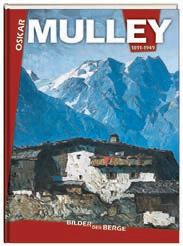
More information about the book at www.mulley.eu
>>
Info · Tickets
T +43 (0)5373 81000-20 karten@tiroler-festspiele.at www.tiroler-festspiele.at
OPERA
GAETANO
DONIZETTI
DON PASQUALE
Conductor Francesco Lanzillotta Direction Caterina Panti Liberovici 27 DEC / 04 and 06 JAN
OPERA
SAVERIO
MERCADANTE
FRANCESCA
DA RIMINI
First performance in Austria Conductor Giuliano Carella Direction Hans Walter Richter 28 DEC / 03 and 07 JAN
JUNGES FESTSPIELHAUS
FAMILIENKONZERT
DIE FLEDERMAUS
IM FESTSPIELHAUS
A selection of compositions from the famous operetta by Johann Strauss 29 DEC
SPECIAL AMICI ENSEMBLE & UDO WACHTVEITL CASANOVAS RÜCKKEHR
Reading with chamber music 30 DEC
CONCERT
CARL MILLÖCKER
NEW YEAR‘S EVE CONCERT
Songs and melodies of operettas by Carl Millöcker
Conductor Giuliano Carella 31 DEC
CONCERT
NEW YEAR‘S
CONCERT
Selected works by famous French composers 01 JAN
SPECIAL MUSICBANDA FRANUI
STRG F VOLKSMUSIK
The unmistakeable sound constellation of east Tyrol 05 JAN

An enjoyment of culture leads to beaming faces, even during the darker times of the year. A shared experience of cultural highlights forms the core of the work at UNOS 93. Margarethe Egger as Chairwoman presides over an association which is committed to culture and togetherness in Langkampfen.
The Langkampfen Lights are dotted right across the region. As soon as the sun sets, bright illuminated windows can be seen everywhere. Here and there is a flickering lantern, sparkling Christmas lights and shiny decorated Christmas trees. But there is no chance of a silent night on this Advent evening. Because there is chatting, laughter and singing at one of the illu minated windows. It is an Advent window.
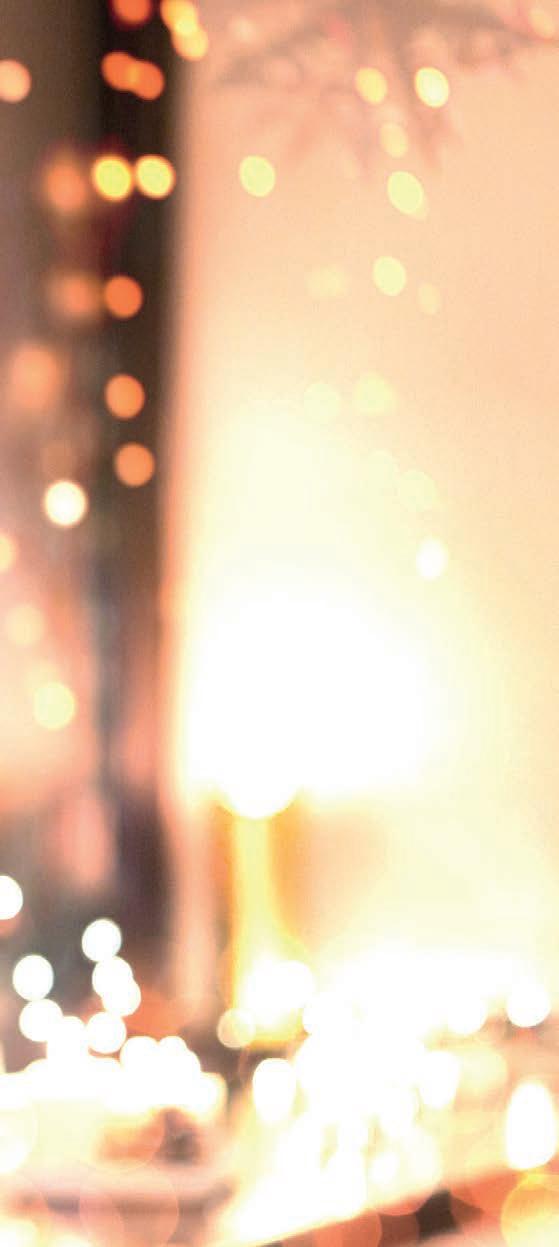
The campaign was launched by the UNOS 93 association. The ‘Association for Culture and Community’ was founded over 25 years ago. The letters of the name represent the districts of Langkampfen: Unterlangkampfen, Niederbreitenbach, Oberlangkampfen and Schaftenau. For the last three years, Margarethe Egger has chaired the association. Together with her dedicated members, deputy Josef Greiderer, secretary Gabi Hager and treasurer Renate Bamberger, she puts together a considerable cultural programme every year: cabaret, concert and cinema, literary events for the adults, introduction to reading for the kids, a repair café and weeding initiative – a very comprehensive year’s programme.
“Our primary aim is to awaken the interest of the people of Langkampfen but guests are welcome too, of course,” says Margarethe Egger. The programme is easily accessible so that as many people as possible feel included. The former Director of Langkampfen Secondary School and subsequent school inspector takes a broad view of culture. “We want our events to be wide-reaching and so we founded an association for culture and community.
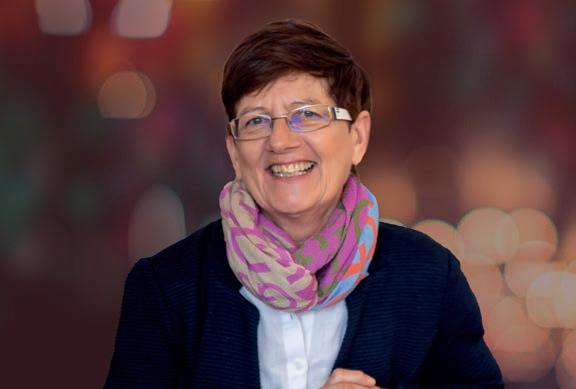
Scan the portrait of Margarethe Egger with your smartphone and listen to the Chairwoman explain what makes the UNOS 93 association so special. Download app on p. 4.
This gives us freedom when it comes to designing the programme”. Many projects have been implemented in collaboration with the community of Langkampfen and local cultural and environmental committee. During monthly meetings, the members of the association discuss upcoming events. They undertake the planning as well as being responsible for the implementation. Margarethe Egger dedicates endless hours in her role as a voluntary culture manager. “As a teacher, you work to serve the public. The dedication to the community does not simply stop when you retire!” Margarethe Egger explains of her commitment to the cultural association.
“Our programme is based on several pillars: on the one hand, we promote local potential by providing a podium. And on the other, we perform an educational role because we want to make a contribution to the community and entertain the people of Langkamfen and beyond with our various cultural events,” the Chair of the UNOS 93 says in summary. One example of this promotion of culture locally is the invitation of local authors to regular events. The dialect poet Rosi Lochmann from the Unterland region will read her works at the Altwirt at the start of November. During the ‘Colourful Evening’, artists from Langkampfen and the surrounding area have the opportunity to perform their music. Events such as ‘A Discussion with Politicians’ before the municipal elections or ‘Reading from the Beginning’ (where parents are invited to introduce babies to books as early as possible) convey important information and cultural techniques.
Even in times of isolation, UNOS 93 wants to be a symbol of community togetherness. The aforementioned Advent window aims to boost the village sense of community. “It is not about who has the most attractive window but rather about coming together during the cold time of year. Those involved decorate their windows. People gather outside, there
On 8 November at 19.30 with Rosi Lochmann

Daily from 1 to 18 December at 19.00, Saturday and Sunday at 17.00 at various homes in the community of Langkampfen
On 18 December at 17.00, Langkampfen Parish Church
The programme for 2023 and additional information can be found on the association website at www.unos93.at.
is mulled wine and perhaps a few biscuits,” says Margarethe Egger of the existing simple concept. The hosts receive an illuminated number from the association. They prepare the window by themselves and some even invite traditional musicians or play an instrument. Each hosts designs their own window, as Margarethe Egger emphasises. „There are no rules. The Advent windows are a newly launched tradition which impresses – and perhaps it might become a role model for other communities”. In 2022, the Advent windows will again be captivating visitors. The community campaign by UNOS 93 certainly brings joy. And this is a joy which shines brighter than any Christmas lighting.
Photo/Video: ÜberallFrom 26 November, artisans and culinary treats await in the casemates of the Josefsburg and a Christmas workshop will be set up too. Here in the historic ambience of Kufstein Fortress, all the family can get into the Christmas spirit.
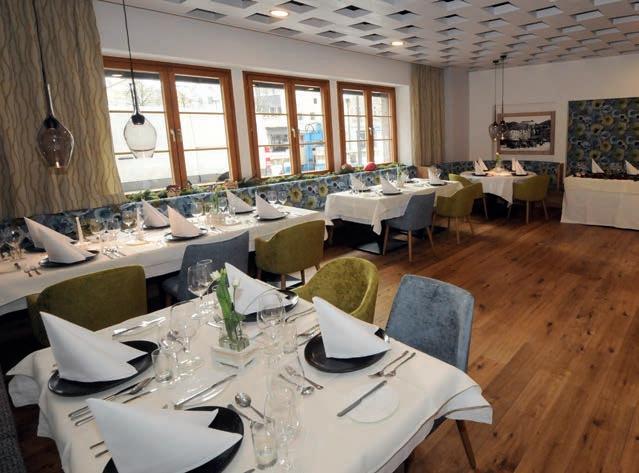
What would the Advent period be without Christmas markets? A small yet refined Christmas market will be held in the Stadtpark in the centre of the fortress town from 25 November. Which association has created the best mulled wine this year? Find out with a tasting!
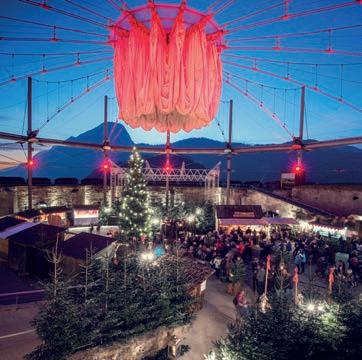
During the Advent period there are endless options for listening to traditional brass band music. On 24 December at 18:00, the tower performance will take place again outside the Sparkasse tower in the Oberer Stadtplatz in Kufstein.
More information in our events calendar at www.kufstein.com
Let it snow! Want to see the snowflakes dance? Simply scan the image with the open Livi AR app on your smartphone and see what happens! Download app on p. 4.



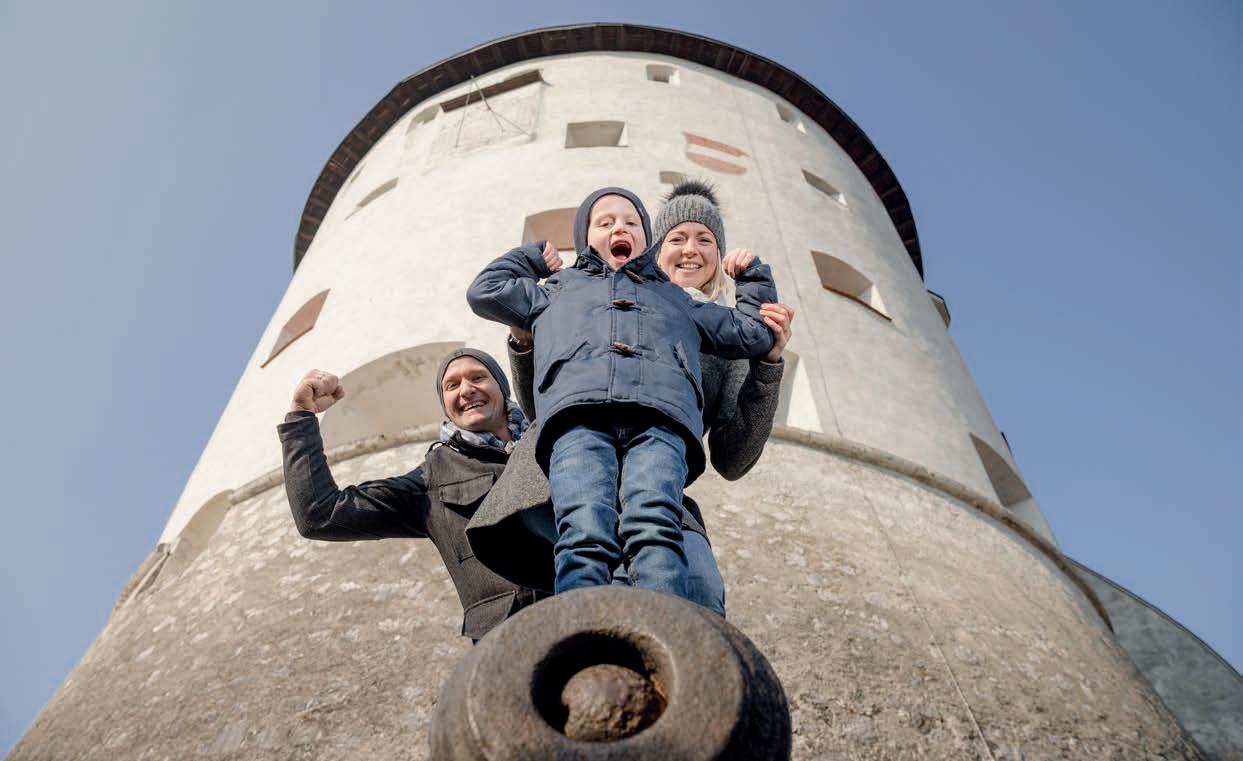
Visiting a town with children can be a challenge – but it doesn’t have to be. In Kufstein there are a wide range of leisure opportunities, delicious refreshment stops to suit any taste and a colourful programme for mini conquerors of the town.
In Tyrol’s second biggest town at the gateway to the Alps almost everything is accessible on foot. Despite the small town ambience, Kufstein always has plenty of attractions up its sleeve. One of them catches the eye immediately: surrounded by imposing mountains, the historic fortress towers high up into the sky. These old walls on the 90m fortress mountain right in the town centre fascinate
visitors of all ages. You can reach the top on foot or on the panorama railway. The 60m deep well, mystical secret tunnel and former prison all impress little knights and princesses. Several canons catch the attention in the Elisabethbatterie. A visit to the fortress arena (open daily) is undoubtedly an exciting journey back to times gone by.
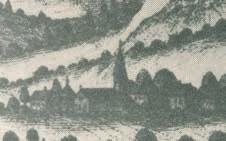
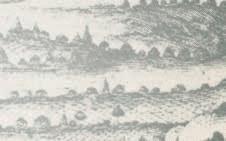
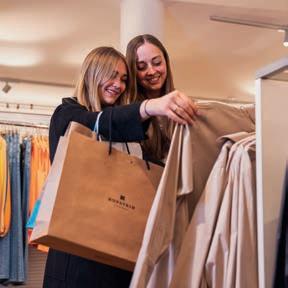


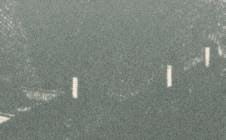

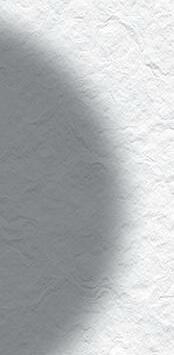

















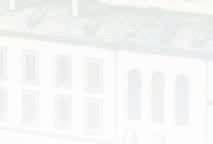



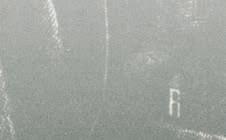

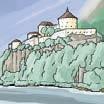

Back in the present day, the Unterer Stadtplatz square and historic Römerhofgasse are the perfect place to take a stroll and enjoy yourself. You are bound to feel your stomach rumbling after taking in the fortress. Several traditional yet modern restaurants serve up delicious dishes – including for little explorers. Once your hunger has been satisfied, a detour to the Hans-Reisch-Strasse is recommended. Dotted with small yet refined shops and coffee houses, the alleyway links two central shopping streets in the fortress town. Kufstein is particularly popular for its colourful selection: small boutiques, some specialising in children’s fashion, form part of the town landscape alongside famous chains. The Kufstein Galerien and Inntalcenter are home to two modern shopping centres which are linked by a bridge.

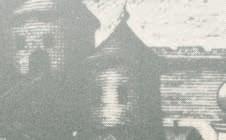


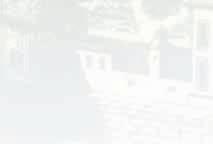

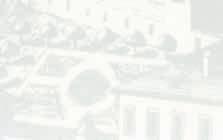
 Peakmedia/Dominik_Zwerger
Peakmedia/Dominik_Zwerger
On your blades, get set, go!



After a shopping stroll, it’s time to head to the modern ice sport facilities at the Kufstein Arena which offer icy fun on two blades from September to March! Put on your ice skates and off you go! If you don’t have your own equipment, you can hire skates of all sizes for a fee. The ingenious lighting concept creates a special atmosphere on the covered ice surface and outside area. You can also enjoy an energy boost or warm up with a treat from the kiosk during the public opening hours.

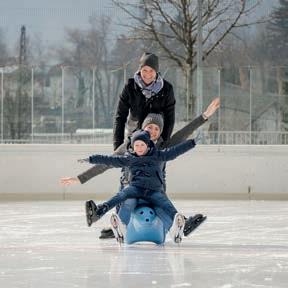
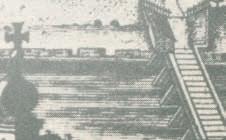

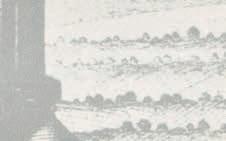

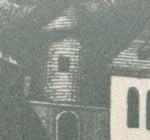
When Mother Nature shakes her snowflakes over the fortress town, the Hechtsee is transformed into a true winter wonderland. A walk around the frozen lake provides an idyllic family experience. The snowy backdrop is like something straight from a winter fairy-tale.
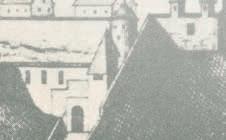
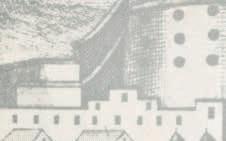
On the path of the historic city trail: The historic city trail passes in 23 stations around the fortress hill, through the varied city history of Kufstein. Picturesque alleys, lively squares and exciting personalities open a window to the past and show new perspectives on the present. www.kufstein.com


Christoph Bichler has re-interpreted one of the oldest luxury drinks known to man at his brewery in Schwoich. Away from the mainstream beers, the Bierol brand represents sophistication and versatility. In our interview, the expert explains what makes these unique beers so special.
Back to the start: how did ‘Bierol’ start out on its journey to success?
I was in the USA for 14 months and initially drank imported beers until a local looked at me strangely! When asked why I wasn’t trying their local beer creations, I couldn’t find an answer. And so I set out to explore the many small breweries and immediately realised that there are some wonderful, creative and very hoppy beers being made there. You could say it was love at first sip!
Back in my homeland, I started to brew beer in my own free time in 2013. Once my father had taught me the core basics, I started to try out my own recipes. Inspired by my experiences in America, my focus was on pale ales. Production of these hoppy beers remains our speciality still today. We mostly brew top-fermented beers and use lots of hops. For example, we use 8 kilograms of hops per 1,000 litres for our ‘The Padawan’ beer. The result are beers with a very intense fruity flavour.
We have our roots in Schwoich and repurposed my father’s former guesthouse into a brewery. While I brew the beer, my sister Caroline has opened the Restaurant Taproom alongside our production facility. Chef Thomas Moser creates a real explosion on the palate in his kingdom and has been awarded a Gault Millau toque for his skills. Freshly poured Bierol beers from nine taps are also available to sample with your meal.

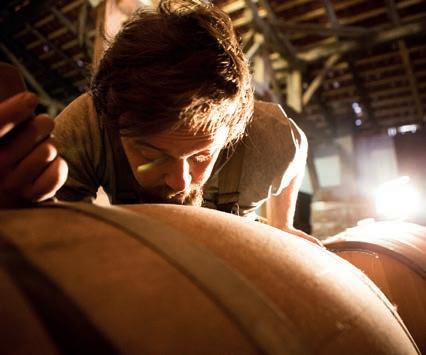
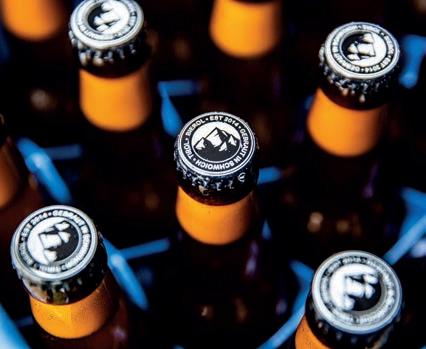
Different beers can be created from just a few basic ingredients – malt, hops and yeast. Making a minor change to the processes and recipes can result in some completely different flavours. I love to try new things. And the beer fans who enjoy our creations and share their enthusiasm are truly the cherry on top. It’s just wonderful.
We operate a farm and grow our crops on our own fields and in the neighbourhood. We use rye, wheat, oats and barley. As such, we can cover 30% (50% is our goal) of our cereal requirements ourselves and the rest is purchased from organically certified partners in Bavaria. We also plant hops ourselves. We require 30 different hop varieties on average for our wide-ranging creations. Most are sourced from Hallertau in Bavaria or the USA. Hop growing is very time-intensive and is heavily
influenced by climatic conditions. The hops from the USA are very fruity, for example, whereas those from Hallertau are spiced and earthy.
Bierol is renowned for its special flavour notes. How do you come up with the ideas?
We make beer – that’s what it’s all about. Many believe that we add different ingredients to all our creations but that is not the case. Our most popular beer, ‘The Padawan’, has a very fruity mango flavour, for example. This note is created using a special combination of hops and yeast. We do also make beers with extra ingredients such as our pumpkin beer for the cold season. Regional and seasonal thought processes also play a key factor in these creations. Right behind our brewery, our partner Georg Miggitsch tends to a vegetable garden with great care and supplies us with special ingredients for our beers. Pumpkin, for example, contains a lot of starch in its flesh which we transform into sugar during the brewing process. We also add cinnamon, cloves and coriander to this beer. Our passion for
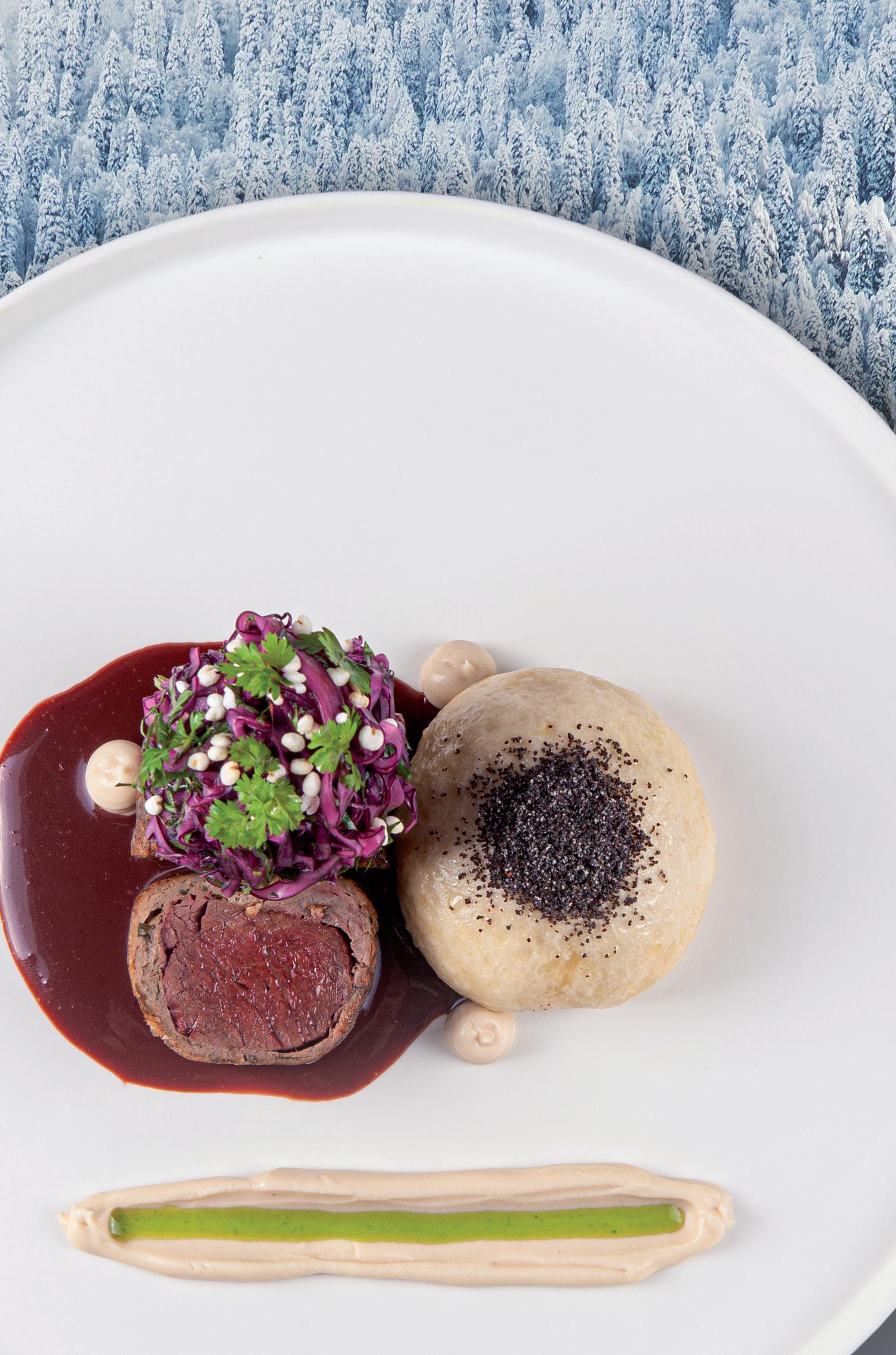
How is the Bierol beer made?
Want an insight into the production process? Scan the image and Christoph Bichler will take you through his brewery. Download app on p. 4.
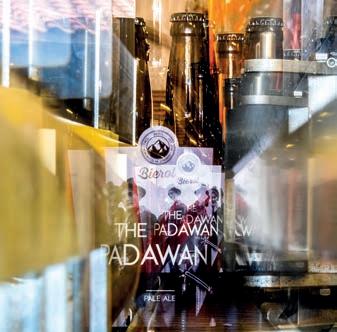
You have already received various awards for your brewed delights. Which mean the most to you?
Gault&Millau voted our ‘Bomboclaat’ as Beer of the Year 2019. The dark beer is stored with coconut flakes and Zotter cocoa, leaving a lasting impression. We are particularly pleased with our rating on a global beer app: with 53.000 ratings, Bierol tops the list of hoppy beers from Austria.
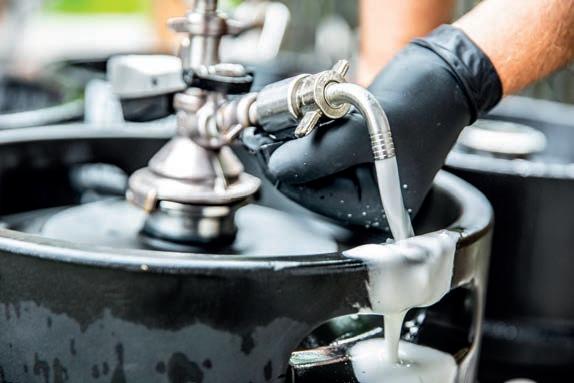
We want to protect what we love – the mountains and nature. And so with our ‘Protect our Winters Austria (POW)’ project, we have come together to advocate for proper recycling with our joint ‘Cold Stoke’ beer in a can.
Many people believe that cans are an environmentally harmful form of packaging for cheap beer. We want to dispel this myth. Cans are not only good for recycling; they also keep out light and oxygen and therefore help to keep the beer fresh. In short, beers taste fresher for longer in a can than in a bottle. We have long grappled with the question of what is the right packaging to use. The more we researched, the clearer it was that cans present a pleasant surprise where the ecological impact is concerned. Compared to production from scratch, 95% of energy is saved with the recycling of glass compared to aluminium. Another benefit is the weight: unlike standard bottles, cans are much lighter and therefore generate fewer emissions during transportation.
Last but not least, are there any myths about beer which you would like to debunk here?

Not all brewers have a beard – our apprentice doesn’t have one yet! (laughs).
What does Bierol stand for? Beer and Tyrol
Your favourite beer? The Padawan
Team size? 6 beer enthusiasts
Secret to success? Unusual beers with the right balance
Sports, sports fans will find everything their heart desires! A professional ski service completes the comprehensive offering. The business also has its own ski school including ski hire right on the crosscountry trail.
Learn cross-country from a professional Runner up in the World Championships and 4x Olympian Franz Schuler and his team offer private lessons or group courses in classic or skating style at the cross-country ski school.
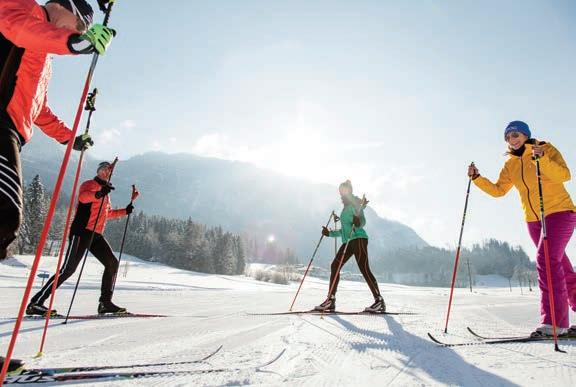
At the Schuler Sports family business in Schwoich, crosscountry skiing has a tradition which dates back decades. The sport is gaining in popularity – not without good reason –probably because it is one of the healthiest forms of endurance exercise alongside swimming and can therefore be undertaken at any age thanks to its broad distribution of load on the body’s muscles and the lack of strain on the joints.
Nordic Centre in Schwoich
Thanks to the new cross-country skiing centre, the conditions offered for cross-county in Schwoich can be elevated to a new level. As a proud project partner, the team at Schuler Sports completes the comprehensive concept with a cross-country ski school, hire and a cross-country store.
Since last year, there has been a spatial divide between the two core areas of cycling and cross-country. While the focus at the main store at Egerbach 6 is purely on cycling sports, the team at the cross-country store is there to support customers right on the cross-country trail at the Nordic Centre Schwoich, opposite the football pitch.

Alongside the top advice, a comprehensive range of offers awaits. Whether complete cross-country gear, the latest skis, boots and ski wax, accessories or the ideal clothing for out and about – at Schuler
Nordic Centre Schwoich
Dorf 35b, 6334 Schwoich Tel.: +43 5372 / 58339 E-mail: info@schuler-sports.at www.schuler-sports.at www.facebook.com/schulersports www.instagram.com/schulersports
Our opening times on the trail (start November – end February)
Mon, Tues, Thurs & Fri: 14.00 - 18.00, Mornings by prior arrangement only Sat: 9.00 - 12.00 | Afternoons by prior arrangement only. Closed Wednesday and Sunday.
Opening times apply only with sufficient snowfall. Please enquire in advance by telephone, email or internet.
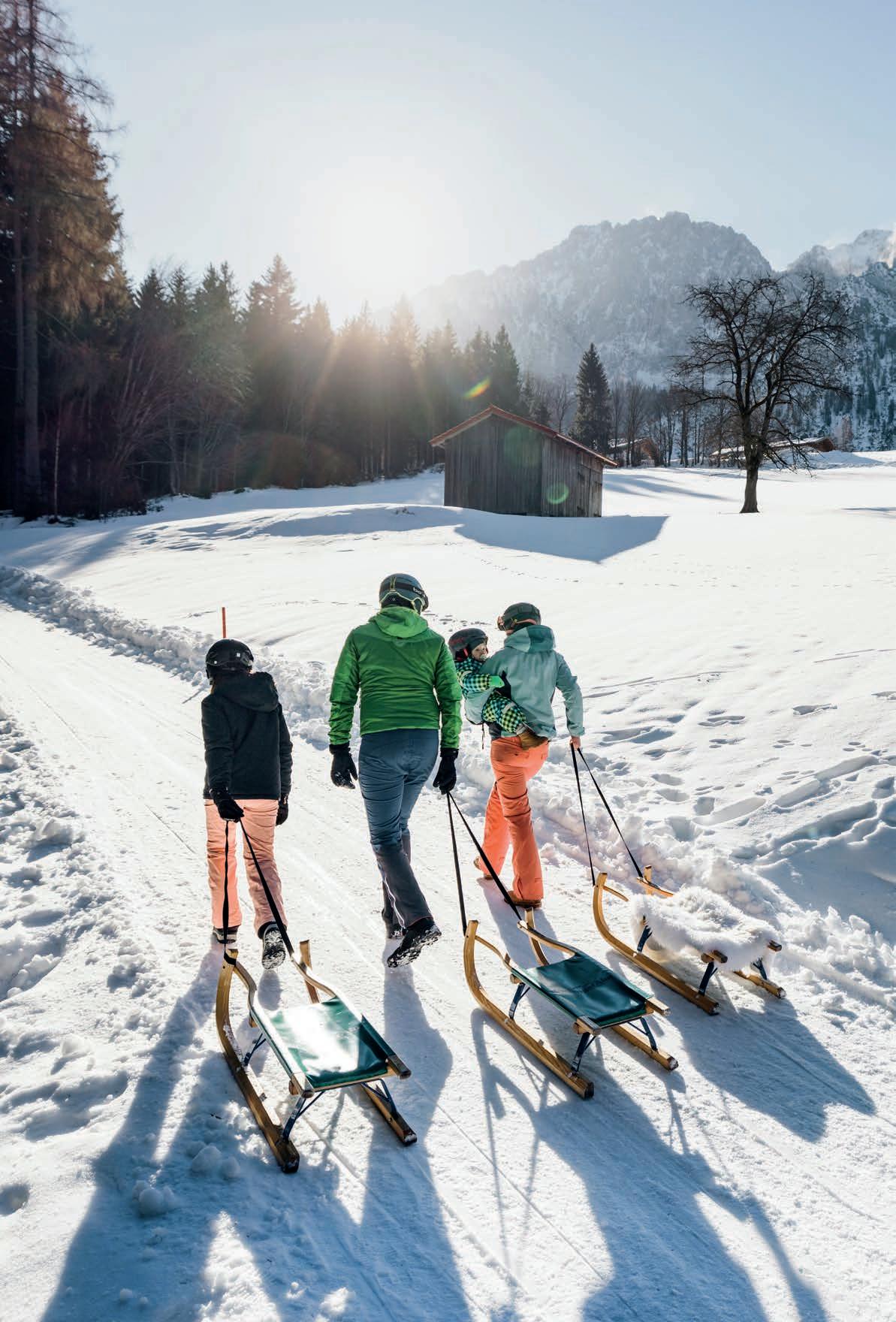
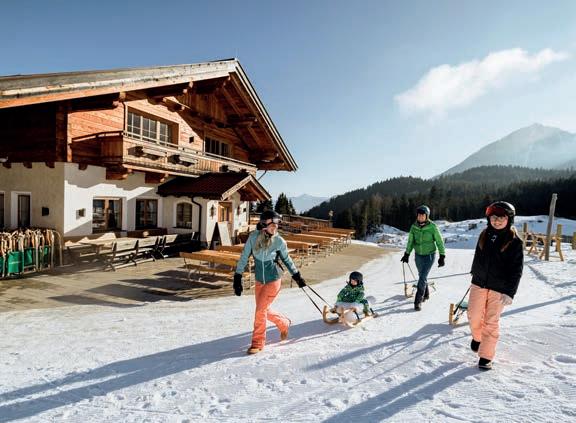
It’s a slow climb up the mountain on foot. But the journey back down is much faster – on a sledge! The ideally prepared Aschinger Alm natural toboggan run at the Oberer Buchberg is highly recommended for families: guests of all ages can discover the beauty of nature and enjoy a speedy sledging ride in the snow together.
“How beautifully the ice crystals sparkle in the snow,” the broad fields of snow whisper. “How loud the quiet of winter can be,” rustle the snow-crowned treetops. And the towering mountain peaks promise: “We are watching you on your way up!” But only the sound of your own breathing will accompany us. The gently ascending trail makes our heart thud and eyes sparkle because we know that we will soon be racing back down the track on a sledge. With the wind in our face, we will no longer hear the fields of snow, the treetops and the mountain peaks. Now we will see them pass by instead.
A walk through the wintry forest is wonderful nourishment for all the family: a winter walk is the perfect way to experience the tranquillity of the forest. The combination of a gentle walk and fast sledging session brings plenty of variety. Visitors of all ages have a goal in sight which is well worth the effort. And so the 3 km Aschinger Alm natural toboggan run in Ebbs is a particularly popular destination for all the family. The ascent takes around 1 hour 15
minutes. The natural toboggan run has also been awarded a quality seal on several occasions by the state of Tyrol. The track is characterised by its pleasant gradient and secure bends.
The route to the Aschinger Alm leads across snowy meadows and several bends uphill along the snowy forest road. All eyes are on the track while sledging but during the ascent it’s all about enjoying nature and the views of the Kaiser Mountains.

Anticipation is hugely important on the natural toboggan run. You never know what awaits around the next bend and this defines the charm of a sledging session in nature. Coming to a standstill on a hairpin bend is a no-no. The straight sections are all about enjoying the speed and then braking before the bends: safety comes first when sledging too. Having the right equipment is essential to really enjoying the ride: sturdy footwear with gripped soles is ideal for steering the sledging. Ski clothing is also recommended to avoid getting wet. A ski helmet is required for protection as well as ski goggles to improve visibility during the session.
The journey to the Aschinger Alm leads from the Buchberg car park across the snow-covered meadows to the edge of the forest. A snowy forest road leads its way uphill along several bends. When sledging, all eyes are on the track yet during the ascent, your eyes can go for a stroll of their own: the views of the Kaiser Mountains are truly breathtaking. After the fourth bend, there is a lengthy straight section. The destination is just a few more metres away: the Aschinger Alm is in a picturesque location at the foot of the Zahmer Kaiser in the tranquil Kaiserwinkl. The familyrun Alpine guesthouse is recommended for taking a refreshment break after a strenuous ascent.
• Length: 3.1 km
• Walk time: 1 hour 15 mins
• Elevation gain: 310 m
• Lift facility: No
• Separate ascent: No

• Sledge hire: free from the Aschinger Alm
The Schmidtal valley can be accessed from the Bundesstrasse 172 highway via the Niederndorf district of Sebi. Follow the signs here to the free Buchberg car park.

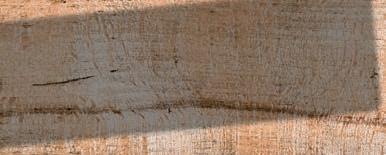













The Ledererwirt is situated close to the end of the Aschinger Alm natural toboggan run. The guesthouse is all about typical Tyrolean cuisine and serves specialities from across Austria and treats from the Kaiserwinkl region. The traditional guesthouse was recently taken over by the younger generation.
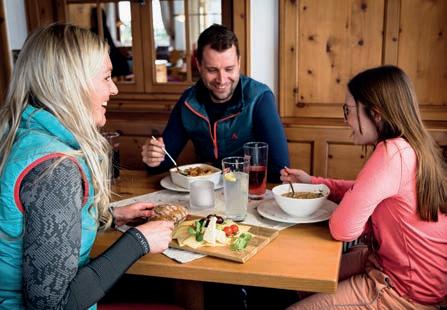
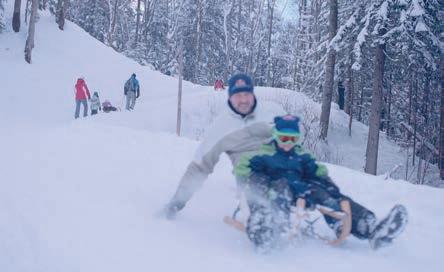
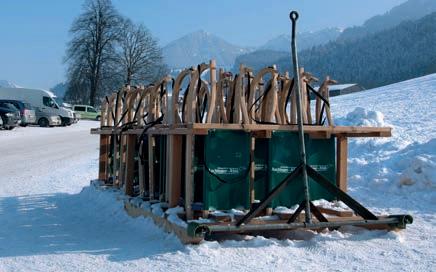
The Aschinger Alm Alpine guesthouse is the perfect place for a refreshment break after a strenuous ascent. Cosy lounges with tiled stoves are the ideal place to while away the time: with hot drinks to warm up and cold thirst-quenching drinks, the family-run guesthouse serves up hot food for an energy boost. Delicious sugared pancakes are served on Wednesdays.
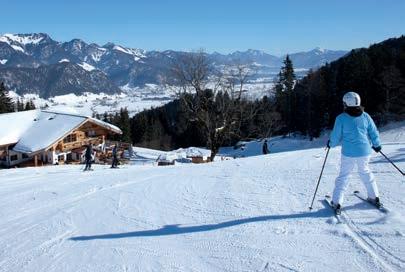
For the last approx. 40 years, Lotte Kaltschmid has been exhibiting her father’s many collector’s items and rare pieces from days gone by in ‘her’ local history museum in Niederndorf.
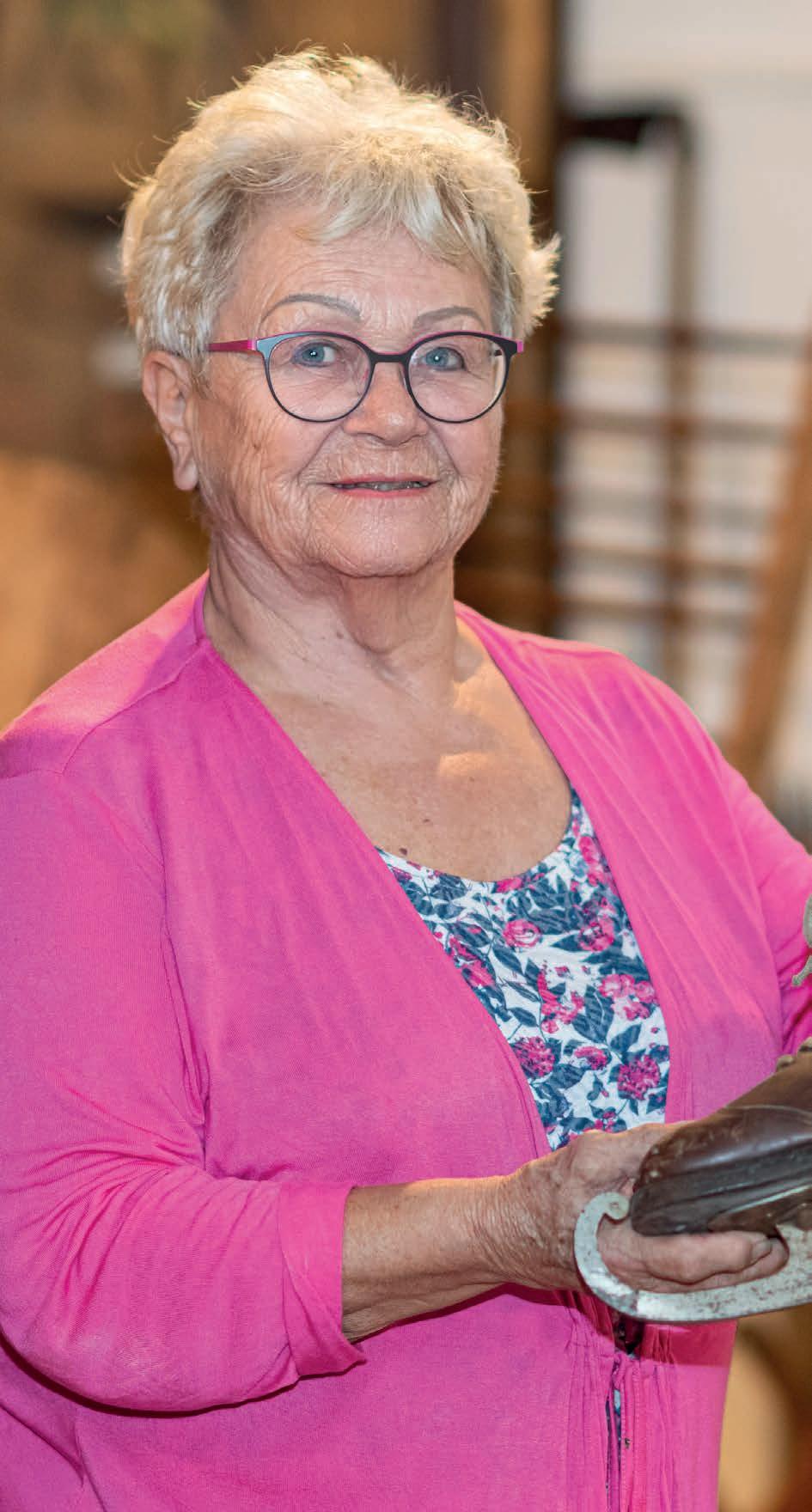

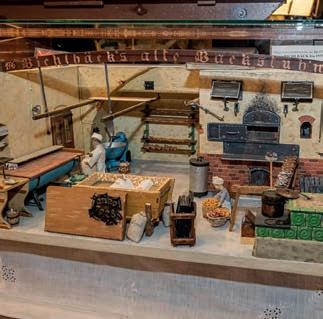
Located in the centre of Niederndorf, the beautifully designed façade and charming entrance area at Lotte Kaltschmid’s local history museum certainly captures the attention. And inside is a whole host of treasures from times gone by.
Two imposing wall paintings above the entrance, old iron gates at the side walls and a wooden sledge decorated with flowers welcome guests to the ‘Zur alten Schmiede’ local history museum before entering the space inside. The doors are opened by Lotte Kaltschmid herself who has already invested four decades of passion into the museum. Although she often had no visitors over the last two years due to Covid restrictions, she made good use of the time with her family and many volunteer helpers: the museum was renovated, redesigned and the exhi bition pieces polished to a shine. “We removed, cleaned and resorted each individual item. There were moments when I asked myself why I was doing it but it was worth it, as you can see,” Lotte tells us as she welcomes us into her parents’ home where the local history museum is located.
During the pandemic, there was plenty of time to completely redesign the museum spaces. “During this period, we did everything we could to catch up on everything required. The older front area was completely renovated,” says the museum director, giving us a glimpse of the extensive renovation work which took place here. The smithy was completely cleared out. There wasn’t a single exhibition item
left because the walls were to be dried out, the ceiling replaced and the windows changed. The technical aspects were updated too. There is now an alarm and fire detection system, new strip lighting and more.
In terms of the exhibition itself, the two focal points of ‘wood and forest’ and ‘linking the Inn bridges’ were added. There is also now a section of the local history museum dedicated to the theme of sport. “It might sound a
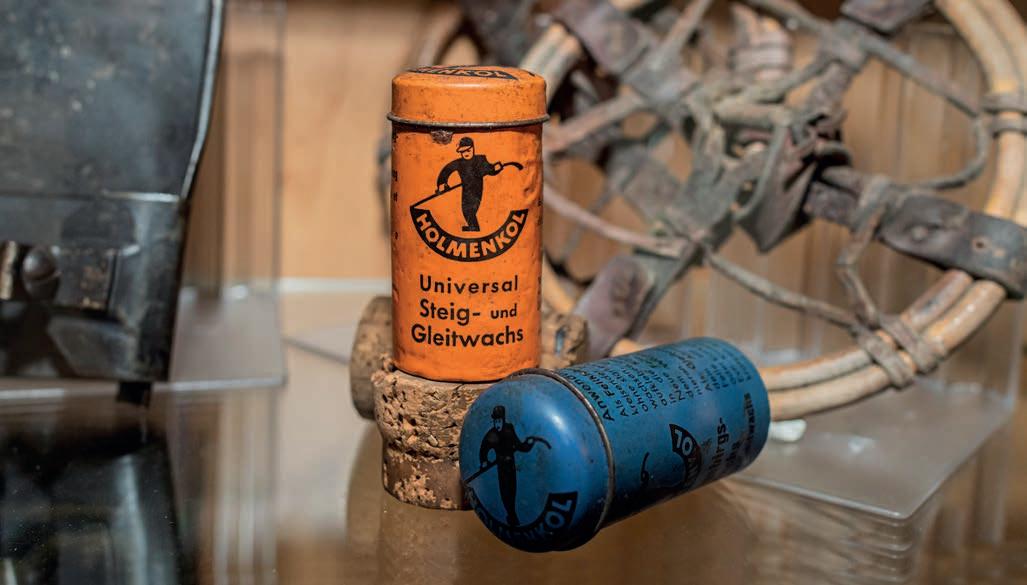
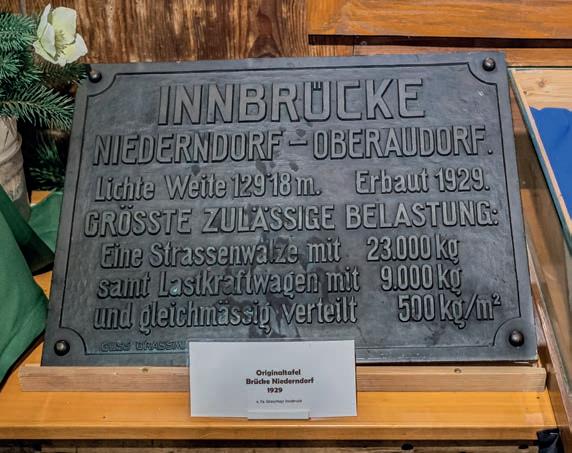
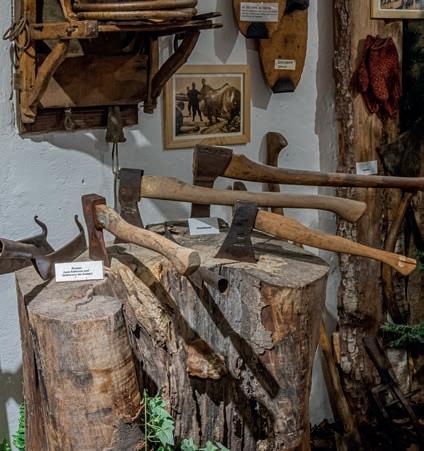
‘Wood and Forest ‘& ‘Linking the Inn Bridges’.
Up until spring 2023, the special exhibitions on the topics of ‘Wood & Forest’ and ‘Linking the Inn Bridges’ can be seen at the local history museum. After that, the manager will devise yet another exciting new topic to add to the museum.
Tours can be arranged with Ms Lotte Kaltschmid by telephone on +43 699 139 198 33.

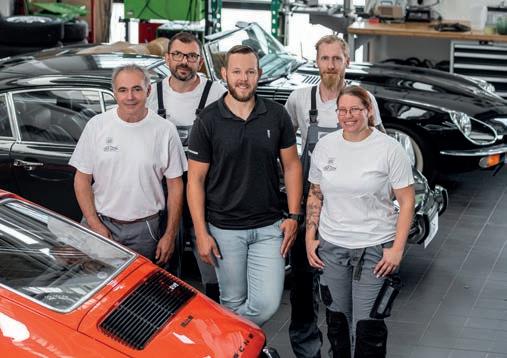
bit pretentious to talk about our sports department,” says Lotte with a smile, “but we have now created a separate area with old skis, ice skates and lots of other testaments to the sports and winter sports domain”.
Apart from that, everything has been redesigned and regrouped. “All of the wall display cases are new. We have also tried to give the exhibition a modern touch by placing themed images by my niece Angela in selected places,” says the museum director. Lotte’s niece has an artistic stream and has been firmly by her aunt’s side during the renovation work. Her images bring accents of colour to the exhibition and present a modern contrast to the traditional artisan professions which form the centre of the themes.
Since the completion of the renovation work, Lotte has been pleased to receive enquiries about her tours again and has welcomed a wide range of visitors. These include tourists as well as locals, student and teacher groups and people of all ages. There are no set opening times at the local history museum because it is run by Lotte Kaltschmid on a private basis. She agrees the tour times individually and incorporates the interests of her visitors. As such, the visits tend to vary in duration. She always has a lot to tell. She links the exhibition pieces with some highly personal memories and stories and it is always a joy to listen to them. Lotte is familiar with the traditional artisan occupations which were actively practised in the area and which are covered in the museum because her father pursued many of them too. She understands the significance of the farm equipment of the last century, knows about the various traditional
The smithy forms the heart of the museum. In addition to the exhibits, some
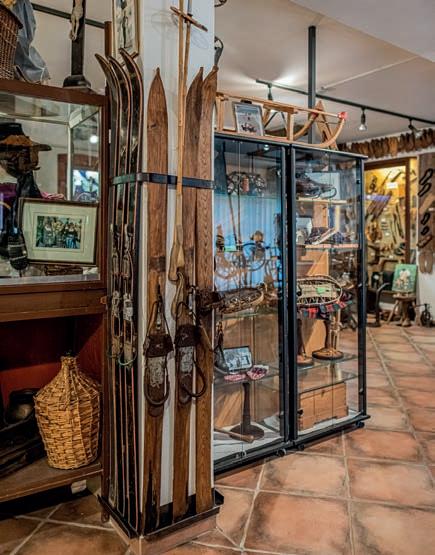
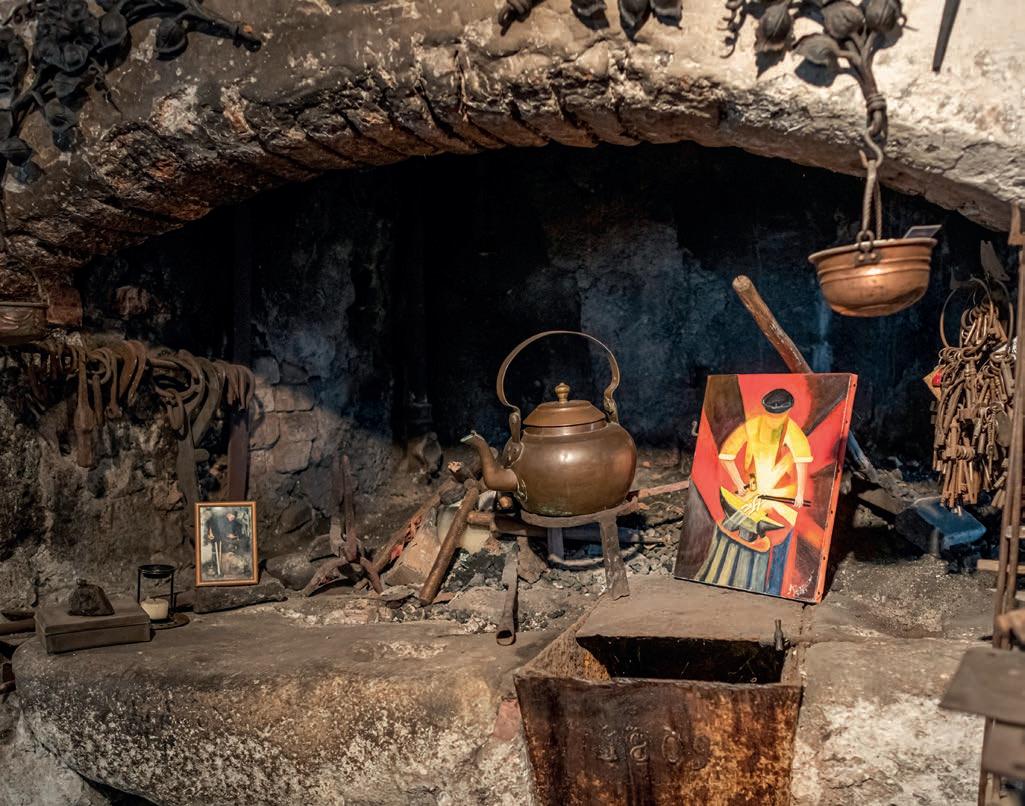
anecdotes from the owner, bringing the exhibition to life.
costumes of the region which are on display and has plenty to say on the corsages which her father collected during his taxi driving. Listening to these tales and reports is interesting and very fascinating. From time to time, Lotte hands various exhibition pieces to the visitors so that they can feel what she is talking about. This makes any tour of the exhibition a truly unforgettable experience.
The museum director runs ‘her’ local history museum in Niederdorf with great passion and enthusiasm and this is evident after just a few moments. During the 1980s, Lotte transformed her father’s many collector’s items into an exhibition and since then has been working on making the presentation even more extensive and more professional. This has made this wonderfully charming museum into what it is today and she can be truly proud of that. The smithy forms the heart of the museum and the double forge, available to view, is one of the special features, along with the anvil. An image of her father takes the observer back to this era and while Lotte gives her explanations, you can really imagine how hard it was to work as a smith. You gain a feel for the tasks to be completed and the challenges her father and his colleagues had to tackle. It is truly a gift that Lotte Kaltschmid shares this legacy with the public, leaving some visitors amazed.
can also
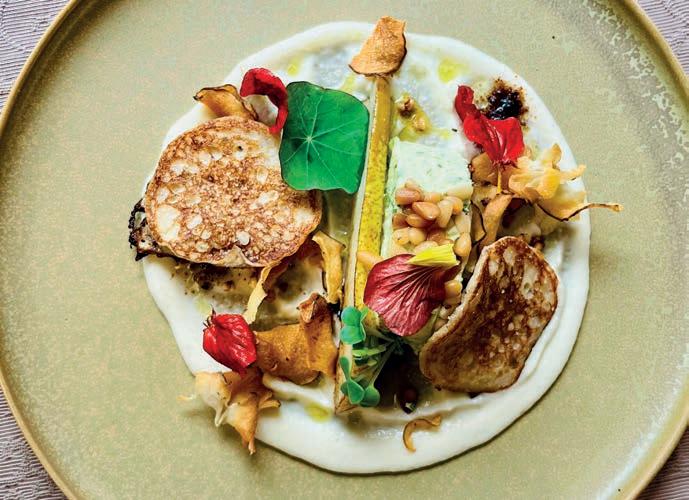


At the ‘Zur Schanz’ inn and hotel at the foot of the Zahmer Kaiser, tradition and innovation are present and perceptible. The passionate hosts combine family history with new ideas.
The passionate kitchen team are placing increasing emphasis on regional and seasonal cuisine, cooking classic inn fare with fresh, modern dishes. Paired wines to complement the dishes are stored in the vaulted stone wine cellar. “Regional products are a core theme, especially in the cuisine. We trust in foods which are authentic and honest and source them primarily from the local area,” the Schanzer hosts explain. Lamb from the inn’s own farm, dairy products from local Alpine dairies, fresh fish from the nearby fish farm, herbs from the farm’s own garden and much more, making a refreshment break at the inn a truly culinary experience.
The family lives in connection with nature and wants to treat its guests to this experience too. Landlord Andreas Egger looks after the herd of sleep in the idyllic meadow in Rettenschöss and in the Schanz stables. The newcomer to farming reawakened a passion for agriculture at the Schanz: “There is also a flock of happy hens, ducks and our reliable mouse police – cat Leo.”
Schanz 1, 6341 Ebbs (bei Kufstein in Tirol), Tel.: +43 5372 64550, E-Mail: info@schanz.tirol, www.schanz.tirol, facebook/schanz.tirol
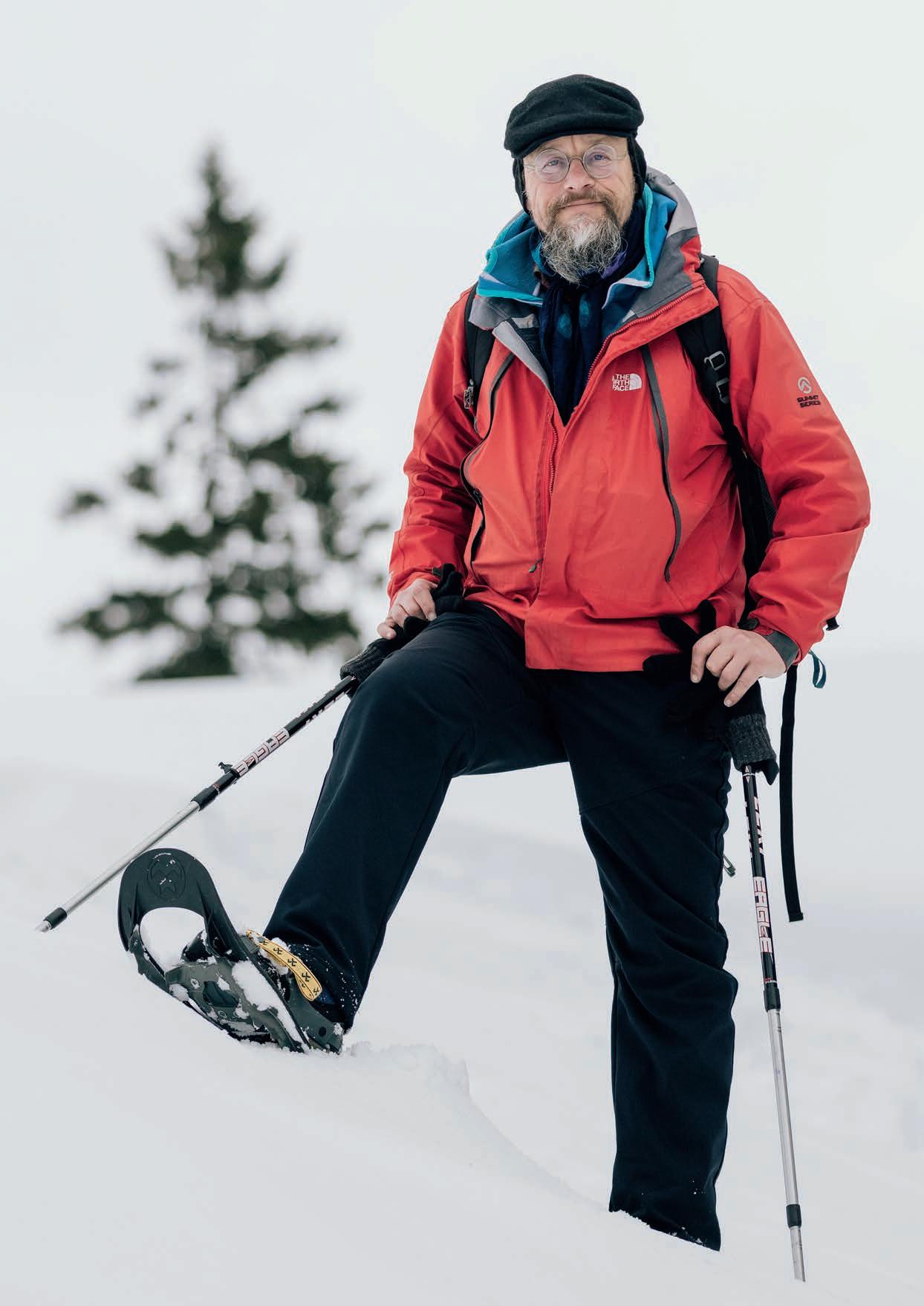
A walk in good company with cool winter air over the snowy forests and a hearty bread snack during a refreshment break at one of the traditional lodges. What more could a snowshoe walker want!
It’s mid-January. The weather forecast for our snowshoe walks on the Erlerberg is not overly rosy but walking guide Harald Löffel refuses to be deterred. He warns us the evening beforehand to dress in warm and weather-proof clothing. He does not hold with postponing the walk. He feels, “Be brave in bad weather! I often say that to people because the fact is: without sunshine, you often see many details differently because you focus on different things”. We can certainly agree with that and so the following day, we head off together for the Erlerberg.
We reach the free walkers’ car park on the Erlerberg and set off. Our destination is the Spitzsteinhaus beneath the Altkaser-Alm. If we didn’t have snowshoes, Harald would have recommended crampons for crossing the dangerous icy spots. Fortunately we do have some and so we put them on after a short walk along the forest trail. Our first

steps on these unusual sports shoes are a bit clumsy but we quickly get the hang of it and notice that the shoes are holding well and it is easy to walk with them across the snowy meadows or slopes and through the white forests. Whereas you would normally sink into the snow, these winter sports shoes ensure that you stay on the surface and cross icy spots without slipping. You have to be careful not to walk on a slant so that the snowshoes sit on the surface. “Walking downhill, it’s best to walk on powder snow and enjoy the fun of doing so! But it’s worth tackling the odd small incline,” says Harry before we finally get going.
Now we leave the forest trail and set off across the moderately steep terrain. Soon we pass a relatively new forest and have to take a large detour around it. The mountain walking guide has been doing the job
The big advantage of snowshoe walking is that you can del ve deep into the wintry nature, regardless of whether or not the footpaths have been cleared. While you would sink down in standard winter footwear, snowshoes come into their own here. They are designed to distribute the weight of the person wearing them over a large area and therefore to prevent the feet from sinking into the snow. Anyone wishing try out snow shoes can hire them complete with walking poles from various outlets in Kufsteinerland. They range from leisurely to sporty, depending on your fitness level, mood and requirements. Since the activity takes place outdoors, careful planning of tours and knowledge of avalanche awareness are key requirements for carefree fun in the snow!
“It’s all about the balance!”
Harry’s motto is also valid with snowshoe walks: if you enjoy the balance between sporting activity and enjoyment of nature, you are doing everything right”.
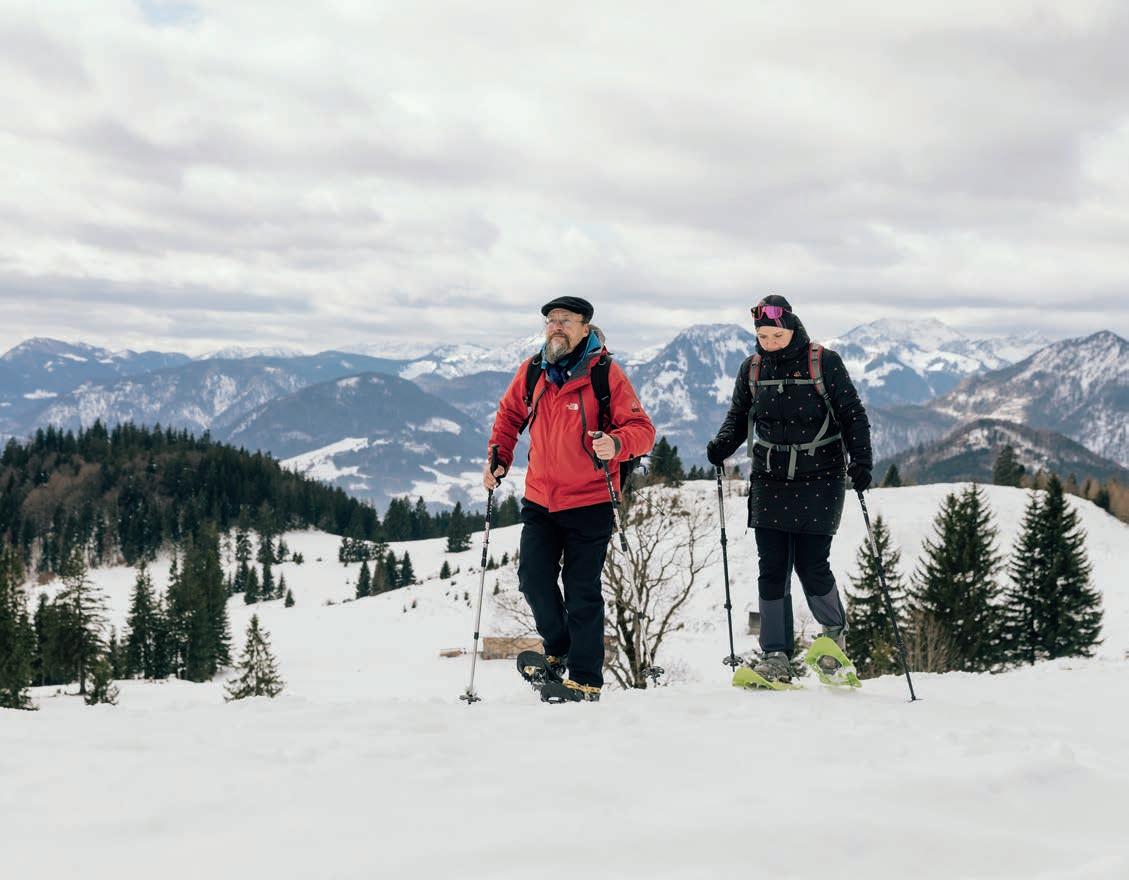
since 1999 and knows this well. “Anyone who has visited routes like this one in summer too has a big advantage. Only then can you appreciate the aspects of nature and view them in winter too”. When we find ourselves on the straight route to the Goglalm, which is unfortunately no longer catered, Harald gets out his mobile phone and selfie stick. We enjoy the wonderful views of the Kaisergebirge, the Inntal valley, Kufstein, Wildschönau and Bavaria. The strange weather conditions submerse everything in an unusual blue lighting which creates some very unique images. Then we continue on and a passing observer tells us we might see hares and chamois or rather deer, as their tracks in the snow would indicate. And so we leave the Gogalm behind us and move on to the Spitzsteinhaus.
When you are out with Harald Löffel, you can truly see how passionate he is about his job. He is now 60 years old and cannot envisage a better job. He doesn’t miss a single tree which he could use as a shelter and mentions endless showcases of nature while he chooses a suitable route for the ascent. The native from Kufstein grew up here and has spent his whole life in this town, although he has travelled a lot too. He is very familiar with the geography of the area as well as its history and culture. He is also a Tai Chi & Qi Gong instructor and offers tours which incorporates these teachings as a linking element. His motto is “It’s all about the balance” and you quickly
• Length: 6.4 km
• Walk time: 2 hours 30 minutes
• Elevation gain: 358 m
Start and destination Free Erlerberg car park
In the village centre of Erl, turn off at an angle opposite the village bakery towards the Erlerberg. Follow this road uphill and at the fork in the path, bear right to the Kranzhorn Alm and follow the road along many bends to the car park.
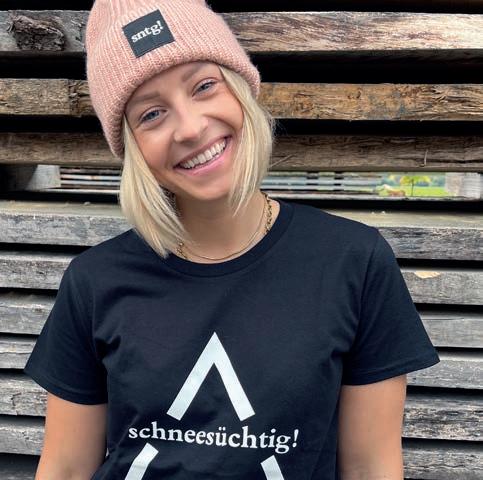
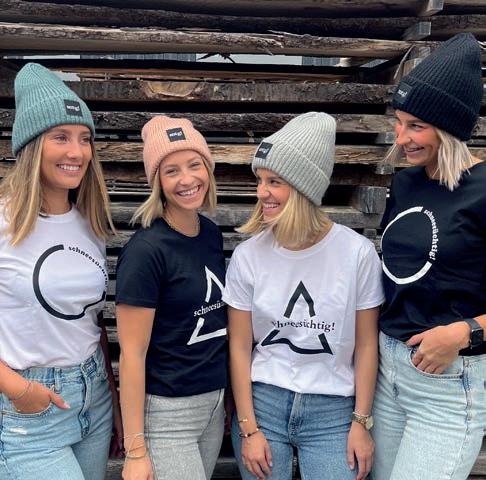
If you hold your smartphone over the image, walking guide Harald Löffel will take you on a snowshoe tour to the Spitzsteinhaus on the Erlerberg in a video. Download app on p. 4.
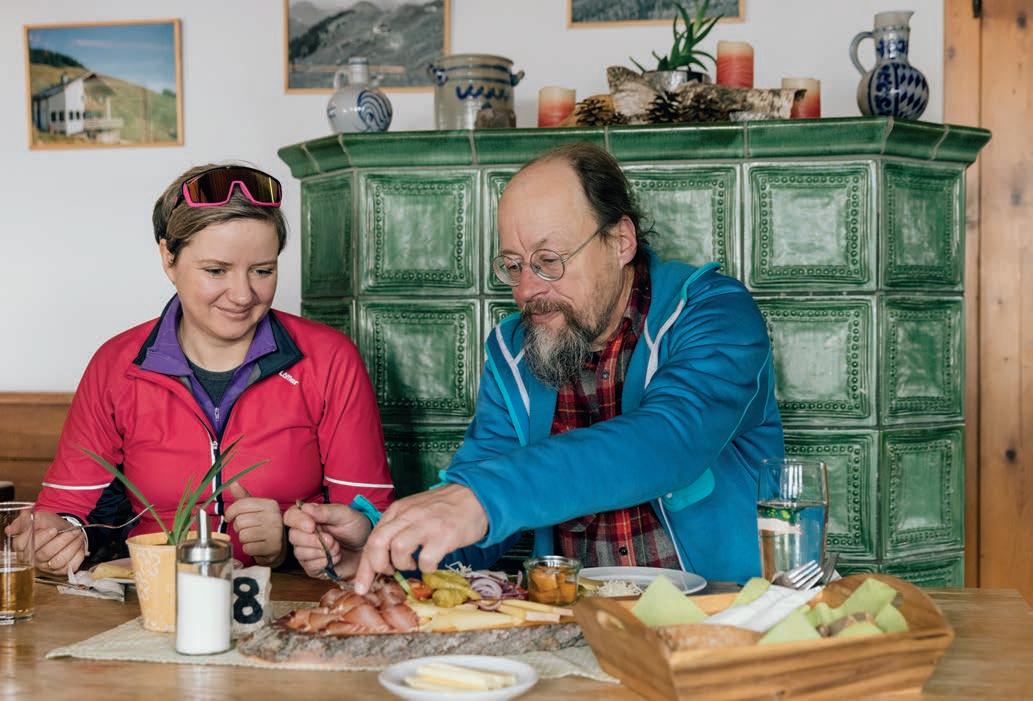
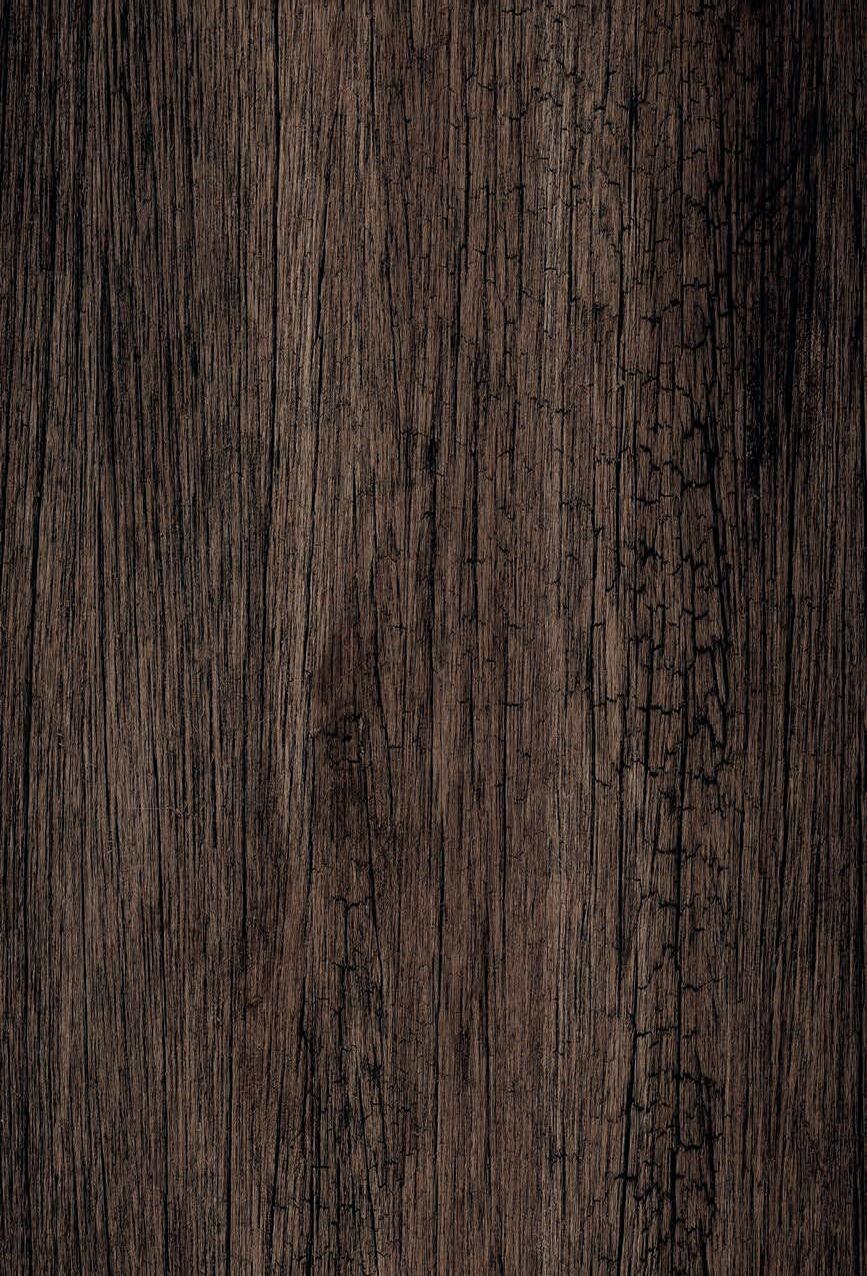

notice that he is a real master of seeing the good and the positive in the present moment. As we walk past the Spitzsteinhaus to the AltkaserAlm, we have to adapt our clothes to the gusting winds as it’s stormy up on top. But that doesn’t stop us from continuing because “fortune
favours the brave!” as Harry calls out with a laugh! The Altkaseralm is unfortunately closed on Mondays but there is a fantastic selection of food on offer for self-service so we buy cheese and smoked sausages before heading back to the Spitzsteinhaus.
Finally we take off our snow shoes, deposit them behind the lodge and look forward to a rest in the traditional rooms of the Spitzsteinhaus. This is a shelter owned by the German Alpine Association and is open daily. We enjoy a fantastic snack of cold cuts and look around the cosy lodge, which offers overnight accommodation, before we head back to the valley. Harry does exactly what he announced at the start: he seeks out short descents with powder snow and races with great joy down the mountain. We go too and it is great fun. Harry’s summary once we get back to the car park, feeling inspired thanks to the many beautiful sights along the way: “Even when the weather isn’t perfect, nature delivers some wonderful moments. Just think about what we would have missed today!”


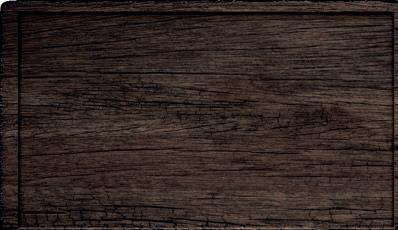

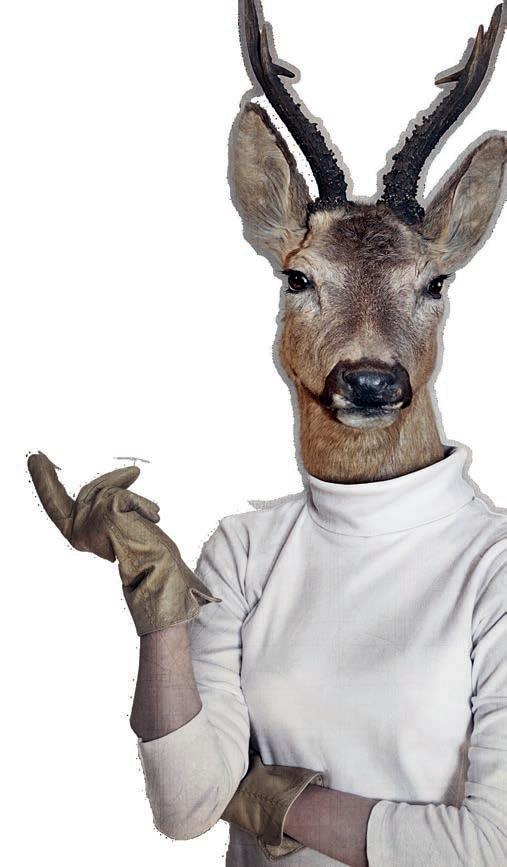
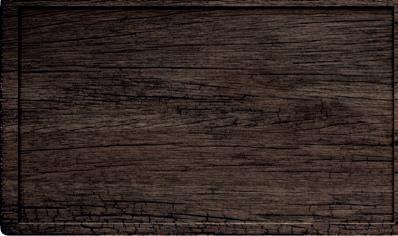

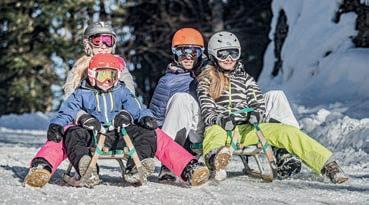
Guided snowshoe walks and other winter activities are regularly offered in Kufsteinerland by the Kufstein Tourist Board, including with Harald Löffel. These can be found as part of the winter adventure programme complete with exact information, prices, times and registration details.
See here for the winter adventure programme.
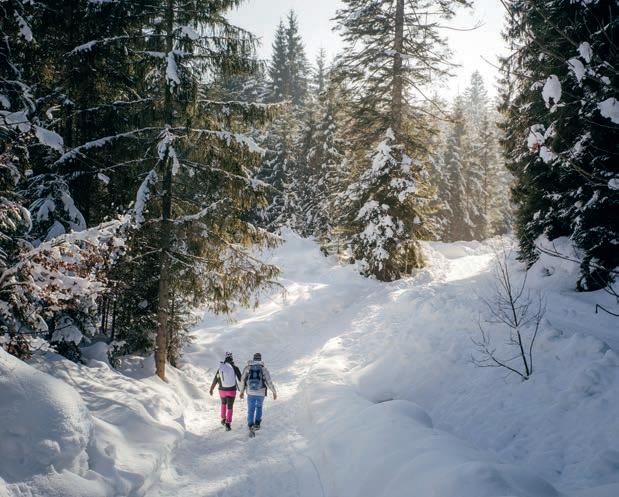
Culture lovers listen up: The renowned Winter Festival will take place from 26 December 2022 until 8 January 2023. Works which have undeservedly been forgotten form a fixed part of the programme. This year, the choice went to Mercadante’s rare treasure of an opera, ‘Francesca da Rimini’: a dramatic piece about a forced marriage with bitter consequences which refers back to a historic event from the 13th century. There are also numerous other highlights on offer such as the Bach Christmas Oratorio on 11 December. On 2 January, there will be two cosy concerts for children and the whole family can enjoy a chamber music performance of the ‘Fled’rmaus‘ during an afternoon performance. Information and tickets at www.tiroler-festspiele.at.
Up until the end of January, there will be a guided walk through the former mining town and current spa resort of Bad Häring every Friday. The tour leads from the village nativity scene with its life-size figures via the mining museum with its unique mining nativity and on via the Trail of Senses to the ‘Hildegard von Bingen Chapel’ with its Oriental nativity and then to the Antonius Chapel where there is a four-part box nativity to admire. Lantern lights accompany participants through the twilight. At the end of the walk, nativity builder Peer shares plenty of interesting information about his craft. Register by 16.30 the day beforehand at the latest at the Kufsteinerland Tourist Office. Free for guests with a KufsteinerlandCard.
An overview of all the events can be found on the website www.kufstein.com
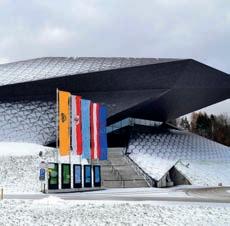
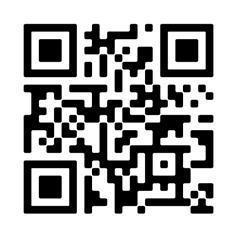
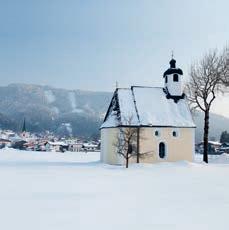
Information is being constantly updated. Subject to change.
This card is the key to a perfect holiday in Kufsteinerland. Every holiday guest aged 4 and over is granted free experiences, attractive discounts and special offers in the region such as one free admission to the fortress. Numerous services can also be enjoyed beyond the region, within a 120 km radium from Bavaria to Tyrol and Salzburg. Also included are activity programmes and themed tours throughout the year.
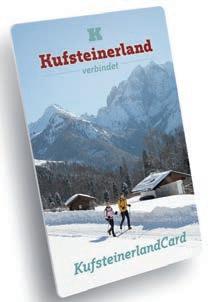
magazine can also be browsed online.

IN HARMONY WITH NATURE Experience the Kufsteinerland region, a winter paradise




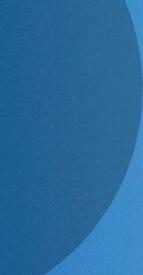
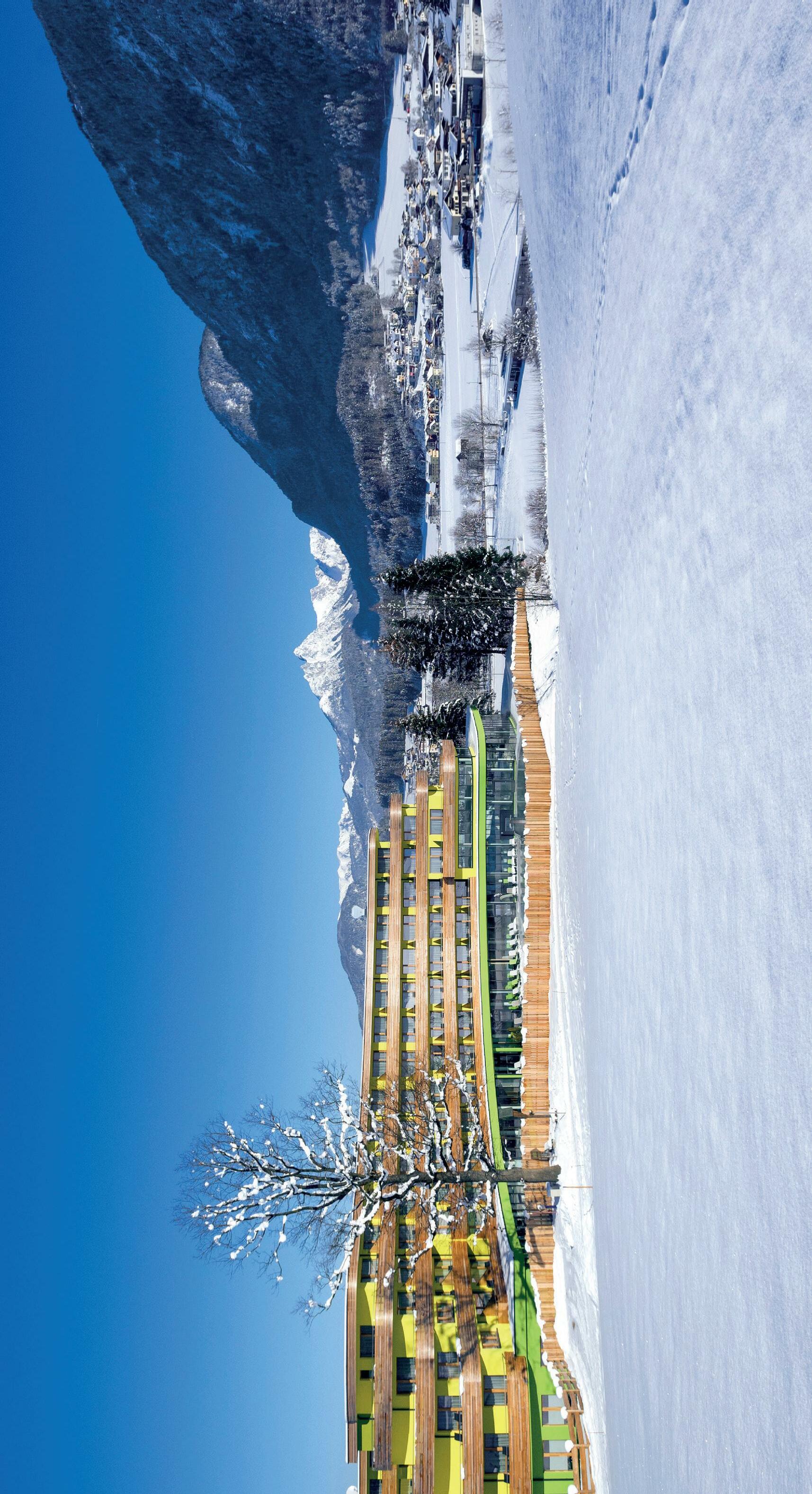
& WELL-BEING
